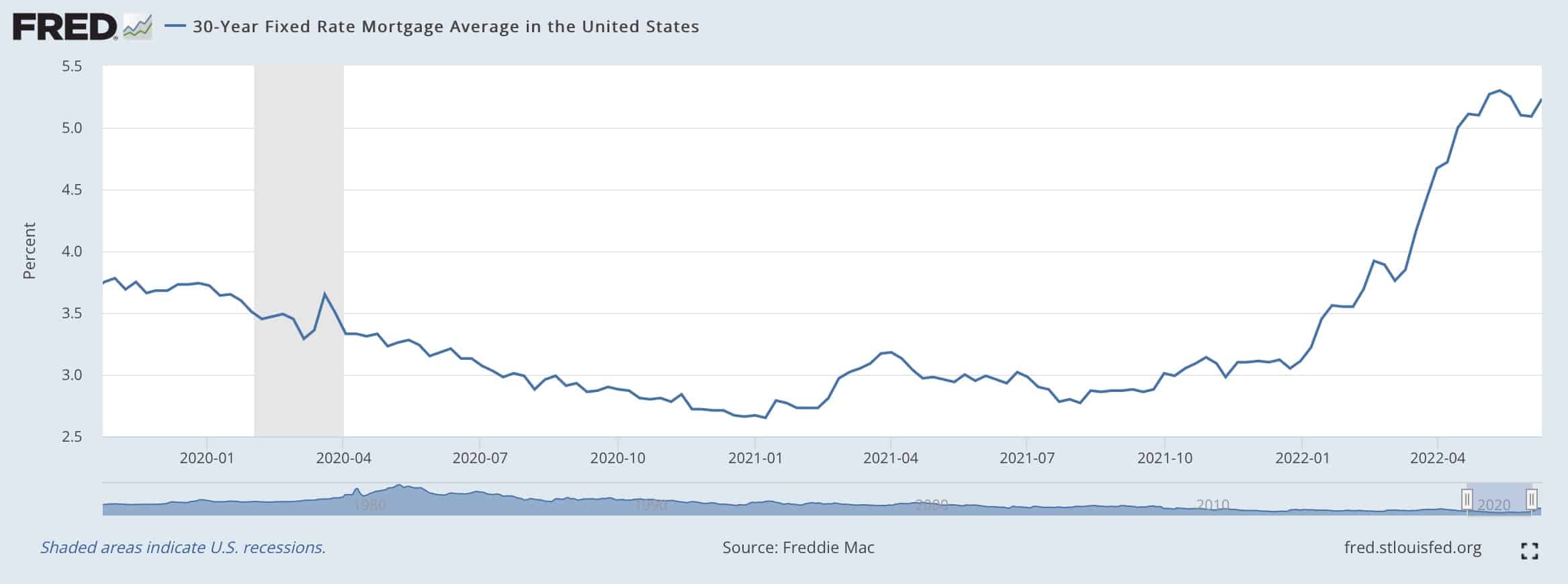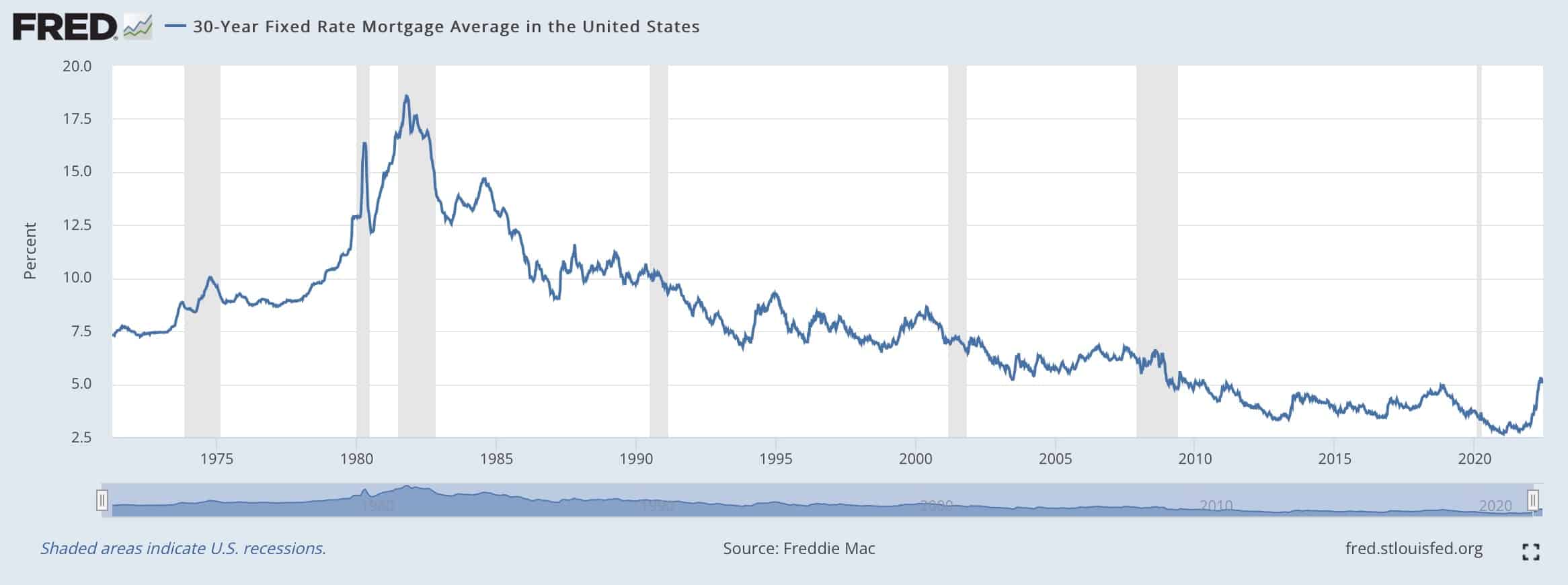Today, the Get Rich Slowly summer of books concludes with an excerpt from Cashing Out: Win the Wealth Game by Walking Away from Julien and Kiersten Saunders. Julien and Kiersten are the power couple behind the rich & Regular blog and YouTube channel.
The following excerpt from Cashing Out (published by Portfolio/Penguin) is used with permission. Copyright © 2022 by Rich & Regular LLC. This passage has been edited to be more readable on the web.
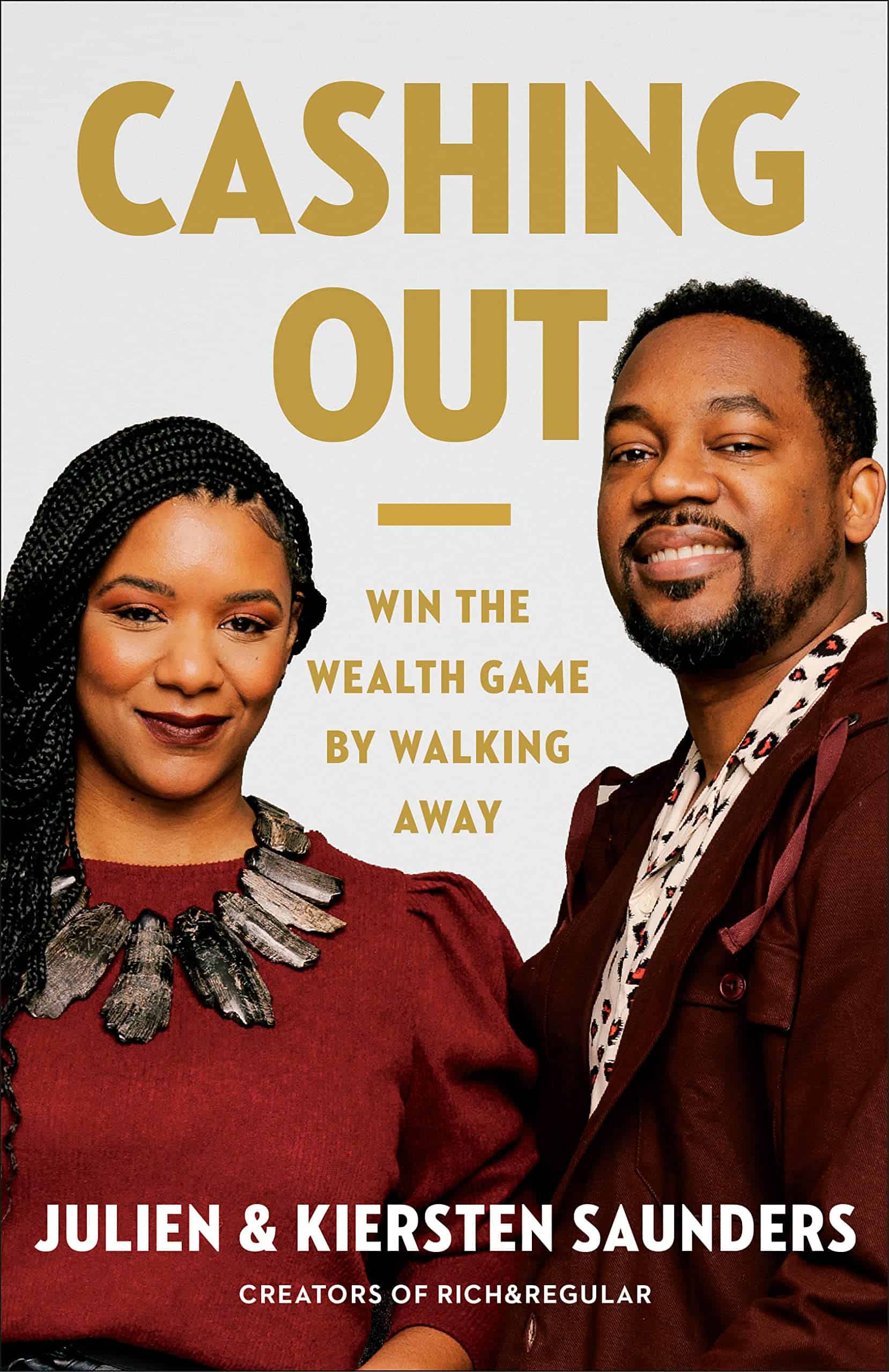 Dr. Sue Johnson is a clinical psychologist who specializes in emotionally focused therapy. She says that when couples fight (regardless of the topic), they’re doing a dance. One partner makes a move, and the other one responds accordingly. She insists the dance is always the problem — not you, not me, not us — and not the topic.
Dr. Sue Johnson is a clinical psychologist who specializes in emotionally focused therapy. She says that when couples fight (regardless of the topic), they’re doing a dance. One partner makes a move, and the other one responds accordingly. She insists the dance is always the problem — not you, not me, not us — and not the topic.
By focusing on the dance, we can shift our focus and look at our interaction patterns whenever there’s an issue. The rhythm of one person responding to the other person’s moves is what ultimately. defines the dance, and our ability to instinctively know when to reach and and grab the other’s hand for a spin requires what Dr. Johnson calls emotional attunement.
If the conflict is the dance itself, think of your emotions as the music. Being emotionally attuned means you can both hear the same song, or at the very least can acknowledge that yours isn’t the only song playing. In other words, it’s not enough to just go through the moves together if one of you is grooving to Barry White and the other is swinging to Barry Manilow.
When you’ve been in a pattern of avoiding conversations with your partner about money, it’s as if you’ve both been attending a silent disco. Everyone’s dancing, but you can’t hear any music. If you want to get attuned, it’s important to understand what unresolved money arguments sound like, emotionally speaking.
Name-Calling: Conversations About Spending
Over the years, we’ve met and spoken with hundreds of couples about money, and the most common argument we’ve heard is about spending. Latoya wants to know why her partner has more shoes than an NBA locker room, while Ricky wants to know why his front door has more boxes than an Amazon warehouse.
In most cases, it’s clear that one person dragged the other to us because they needed them to understand something. They’ll say, “Y’all can explain it better than I can,” or, “Every time I try, it just goes in one ear and out the other.” It always reminds us of frustrated pet owners who bring Roscoe to a dog whisperer because nothing they’ve tried has worked: Roscoe just keeps peeing on the couch.
Almost without fail, as they’re detailing the scene of the conflict, someone says something along the lines of “one of us is a saver and the other is a spender”. The premise is rooted in the assumption that the saver is the good guy, the responsible one, the one who makes the best or better decisions about money. On the other hand, the spender is the bad guy, the irresponsible one who always gets it wrong and needs to be fixed.
- For starters, we’re not relationship police doling out punishment to people who overspend at the mall.
- Second, we disagree with any framing that locks people into fixed financial identities. Those labels are just that — labels. And no single label can fully encapsulate anyone’s identity because in reality everyone spends.
The idea of “savers” and “spenders” is simple, convenient, and easy to remember, but it’s not a reflection of the world we live in. Saving and spending are fluid concepts. The only difference between savers and spenders is the time horizon.
Spenders are spending for today. Savers are setting aside money to spend in the future.
For example, if we save $20,000 in one year to buy a car with cash, and then we spend that $20,000 the following year to get it, are we savers or spenders? It depends on which year you ask us, right?
Getting attuned with your partner starts with freeing your relationship from the contraint of labels, and it’s the first step to inviting curiosity back into your conversations. Whenever you’re having a conversation about spending, you need to go into it acknowledging that there are no villains. Your ability to have a non-judgmental conversation about money requires swapping the paradigm from “good or bad” to “now or later”.
J.D.’s note: Please go back and re-read that last sentence. It is so, so important.
Whenever anybody spends money, they’re chasing a feeling, and the goal of the conversation is to find out what that feeling is. Whether it’s wanting to feel security, spontaneity, or pleasure, once you acknowledge that both you and your partner want the same thing — to feel something — the nature of the conversation becomes less about the spender/saver persona you’ve assigned each other and more about looking at the decision objectively and finding new, creative ways to reach the goal.
Couples usually describe their goal as getting on the same page, but it’s important to go much deeper than that. The ultimate goal with your partner should be to achieve a state of harmony, where each person is allowed to express themselves fully in a way that contributes to your collective dance.
Nagging: Conversations About Saving
Not only does nagging strain a relationship, but it’s also guaranteed to put someone on the defensive because of its persistence.
Saving money is an ongoing part of managing your finances. Over time, constant panicky warnings that someone should be saving more erode the ability to look at any situation objectively. This level of surveillance makes sense in totalitarian governments, but in relationships it’s conversational quicksand. The more you do it, the deeper you sink.
Soon, the reminders about money blend with the daily chorus of other unsolicited prompts to wipe the counters or to take out the trash. It all begins to sound like a broken record. If you don’t get the tone right, at some point the person being nagged will start to think that your real beef is with them, and not about the money at all.
Attunement in this area boils down to classic reframing. As we mentioned, saving is just “planning to spend later”, and guess what’s more fun than talking about what we’re not buying in the present? Obsessing over buying it in the future!
Our tried-and-true advice for conversations about saving is to talk about your future plans. Meaningful conversations about future plans act like a release valve, giving a potentially high-pressure situation a chance to stabilize.
Instead of saying, “Babe, what’s with all the Starbucks cups? We need to be saving, not slurping!”, start your request with an “I” statement. That indicates you’re participating in the conversation as a partner, not a parent. For instance: “I’m so excited to upgrade our TV. I think I’m going to cut back on Chipotle to see what kind of dent that makes in our saving goal. Would you consider doing the same for Starbucks? I’ll bet we could have the cash by November and catch a great deal instead of waiting.”
Anticipation is a helluva drug, and there are positive psychological benefits when you look forward to something. Optimism is more reliable than willpower when it comes to doing things you don’t want to do.
For instance, when we had to cut back on eating out in order to save for a vacation, we’d cook foods at home that were reflective of the local cuisine and play their local music to help set the scene. Sometimes we’d even YouTube the destination and watch other people’s experiences and anticipate what we were looking forward to the most. Not only were these small rewards a welcome distraction from another night in, but they also helped us become more disciplined.
Blaming: Conversations About Debt
It’s pretty common for one partner to owe more than the other, and that disparity can lead to feelings of resentment and insecurity. Constant reminders about how much debt somebody brings to a relationship, as well as the approach they use to tackle it, can be a source of tension.
The person with the debt may feel a deep sense of shame from believing their debt means they’re wrong or bad. On the flip side, the person without debt can feel obligated to help pay for it, which can create resentment. Trying to dance to a song that’s composed of shame and obligation is like trying to waltz to “Cotton-Eyed Joe”.
For Kiersten, the shame surrounding her debt triggered defensiveness. She’d mastered her ability to use religious platitudes whenever she didn’t know the answer to something. She was also accustomed to avoiding conflict in other areas of her life and had learned to live among her problems instead of trying to solve them. From that emotional vantage point, our initial conversation about her debt felt like a personal attack. (And to her credit, it was.)
For us, attunement in this particular area required letting go. Kiersten needed to let go of any romantic notions of being rescued, and Julien needed to let go of his judgment. We both needed to let go of popular debt-payoff plans that treated debt as a moral failing, and learned how to strike a balance where frugality and flexibility could coexist.
Once we teamed up, combined our finances, and started to pay off our debt together, we became critical of the social and cultural norms that created it to begin with. We learned to dance together.
Our approach worked well for us, but there are legitimate reasons to tackle your debts separately, like eligibility restrictions on forgiveness plans or just personal preference. In those cases, you can agree that each person is responsible for their debt and that you won’t ever co-sign for loans together unless you both benefit from it equally.
Either was is fine as long as you remember that regardless the path you choose, emotional attunement still makes it a highly coordinated effort where both people contribute to its success or its failure.
“Tell Me More”
 In any money conversation you’re having, use the phrase “tell me more” as a way to indicate when you don’t understand your partner or need more context. It’s a signal that more context is needed and follow-up questions will allow a better understanding of the other person’s perspective.
In any money conversation you’re having, use the phrase “tell me more” as a way to indicate when you don’t understand your partner or need more context. It’s a signal that more context is needed and follow-up questions will allow a better understanding of the other person’s perspective.
Judgement and harsh language are the equivalent of placing your finger on record player in the middle of your dance. That sharp and sudden scratch completely wrecks the flow and halts the conversation. But saying “tell me more” is a gentler nudge, inviting the other person to continue expressing themselves and feel encouraged to take a conversational risk.
There’s an important caveat to using “tell me more” in charged situations. It’s impossible to feel curious and inquisitive when you also feel threatened and intimidated.
After our first argument, it took a while for one of us (ahem, Julien) to regain the other’s trust related to sharing financial details. For a long time, one of us (ahem, Kiersten) would cry every time we talked about money because she was overwhelmed and replaying “if I’d known, I never would have dated you” in her head.
In those moments, Julien wasn’t blasting Kiersten with the phrase like a fire extinguisher. In fact, using “tell me more” in times like these can do more harm than good, undermining its future use. In hotbed moments, good old-fashioned patience works best. Instead of forcing flammable conversations, you’re better off preserving the dance floor for future use.
The Get Rich Slowly summer of books continues! Today’s excerpt comes from Jordan Grumet, better known in the FIRE world as Doc G, host of the Earn & Invest Podcast. When he’s not talking about money, Jordan is a real-life hospice doc. His new book, Taking Stock, offers lessons from the dying to the living.
The following is from Taking Stock by Jordan Grumet with permission from Ulysses Press. Copyright © 2022 by Jordan Grumet. This passage has been edited to be more readable on the web.
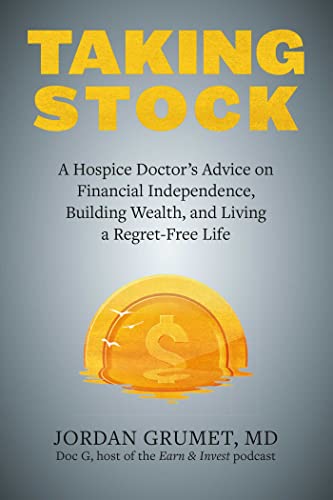 I used to have a patient who was an undertaker. We had many conversations about philosophy and practicality, and it didn’t take long for me to realize that one must gain profound insights from being engaged in such a unique business. As I was often fond of saying: When the undertaker speaks, you should really listen.
I used to have a patient who was an undertaker. We had many conversations about philosophy and practicality, and it didn’t take long for me to realize that one must gain profound insights from being engaged in such a unique business. As I was often fond of saying: When the undertaker speaks, you should really listen.
Those of us who have made death and dying our business may seem unlikely investment advisers, but because both the undertaker and myself have spent extensive time in close proximity to mortality, we’ve been given unique insight into what’s really worth investing in. What investing tips could someone in my line of business have gleaned from dealing with death and dying? Believe it or not, a few quickly come to mind.
These tips weren’t learned by accompanying the wealthy through this difficult journey — although the wealthy have much to teach. These tips weren’t siphoned off of the personal books of those who had little interest left in hiding their secret ingredients to success. These are simple, straightforward bits of knowledge gained from walking down this lonely path with those reluctant to be making the journey.
And believe it or not, most of what I learned about investing has nothing to do with money.
Invest in Yourself
Personal investment comes in many forms. Chief among these is self-forgiveness.
Remorse is common in humans of all stripes — living and dying — and its effects can be devastating. The specifics may vary: an action taken or not taken, a relationship salvaged or destroyed, or an object bought or sold. The human capacity to blame oneself is unlimited. We spend endless amounts of time feeling bad about things we wish we had done better.
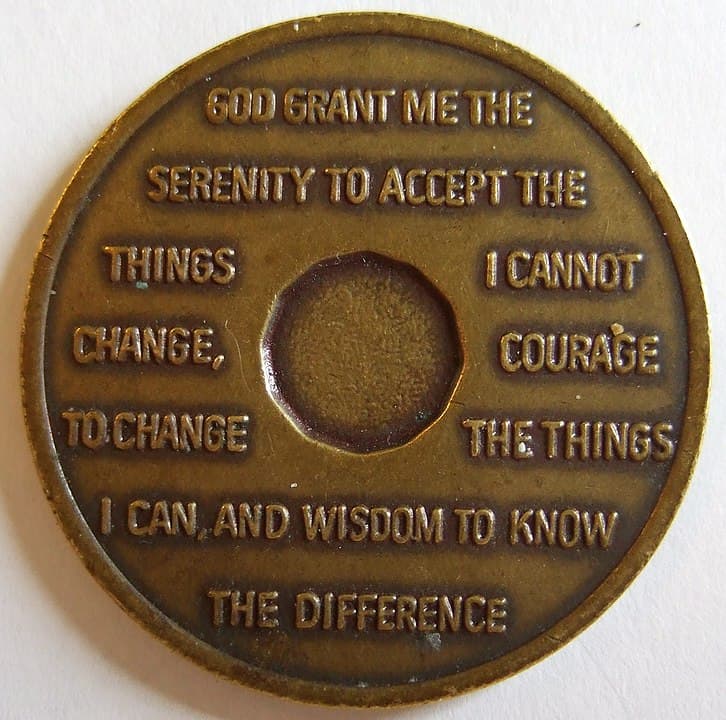 While self-blame serves the purpose of introspection and improving future outcomes, it often leaves a path of destruction it its wake. It’s hard to look forward when you are constantly looking back. The key appears to be changing what we can change and forgiving ourselves for the rest.
While self-blame serves the purpose of introspection and improving future outcomes, it often leaves a path of destruction it its wake. It’s hard to look forward when you are constantly looking back. The key appears to be changing what we can change and forgiving ourselves for the rest.
Losing his job was the least of Gerald’s regrets. Decades before being diagnosed with cirrhosis (chronic liver disease), his exit from corporate America set off a series of events that ended in alcoholism. His marriage fell apart, and he quickly became estranged from his ex-wife and his daughter, Sandy. While sobriety and eventual employment were recoverable, the damage he had done to his body was not. Neither was the estrangement with Sandy.
A large part of the life review process was spent with the social worker exploring his feelings surrounding the loss of his daughter. Gerald eventually was able to find a modicum of peace and forgive himself. He also realized that if this self-forgiveness had been granted earlier, he might have been able to quit alcohol long before his liver became so damaged.
- What have you been unwilling to forgive yourself for?
- What damage is this unwillingness inflicting?
Another common way we invest in ourselves is by slowing down. Often, we have big audacious goals and want to reach them immediately. Yet — as in the story of the turtle and the hare — slow incremental gain is what helps us win the race. If we can make progress toward a major goal by just one percent per month, we’ll have phenomenal annual returns over the long run. This principle applies to a skill, a relationship, or just about anything we strive toward. We mustn’t allow our limiting beliefs to hold us back.
We also need to invest in experiences. Experience compounds over time, just as our monetary assets do. As we learn and grow, we hone skills that make us better employees as well as people. Ask anyone who has risen through the ranks to become CEO of a company. Just like Ben Franklin’s compounding investments, growth in the workplace is anything but linear; it grows exponentially.
And if we are going to talk about investing in ourselves, we would be remiss if we didn’t mention education.
Invest in Education
While there’s no question that I’ve benefited from an expensive four-year college education, there are so many different ways to educate yourself nowadays — read, discuss, take online courses, debate until your face is blue and you walk out of the room disgusted. The world is full of teachers, great and small.
Knowledge is the emergency fund in which you shield your happiness. When all other resources are exhausted, your knowledge will help you secure a job, build a shelter, or make the right decisions at the most critical moments. Don’t skimp on self-improvement, and don’t be afraid to pay for it. The money you spend on education will compound in the form of knowledge and skills.
Say yes — even when you don’t want to. Open yourself to other people’s requests, and jump into an activity that feels foreign or uncomfortable.
The only way to gain knowledge or discover new passions is to be willing to explore. Not only will you be exposed to exciting opportunities, but you’ll also build stronger relationships with those to whom you say yes. Always have your bags packed.
Don’t be afraid to learn new things. I’m continuously surprised by how resistant the average person is to learn about basic finance. Most experts suggest that a few hours of reading each month will make you totally financially competent. Yet the preconceived notion that the subject is too difficult scares many away; don’t let it.
I have watched countless patients die with a book on their nightstand or an unfinished argument circling their brain. This is not sad or trivial. Even those who are dying wake up every morning with a plan for how they will spend each day. Make sure you allow room for acquiring new knowledge. Inquisitive people tend to die as they live: happy and full of questions.
Invest in Other People
The one measure of a person (rich or poor, happy or sad) is in the people whom the person leaves behind. I can think of no greater indicator of success. I know instantly when I walk into the room of a dying patient whether they have invested in other people. They are surrounded by pictures, letters, cards, and friends.
In fact, I usually know who the successful investors are before I even reach the hospital room. There are people walking in and out; noise and laughter peal through the otherwise somber hallways. Smiles and tears celebrate the bittersweet confluence of life and death.
If you invest in people, the compound interest will multiply into a lifetime of love and happiness. Long after you’re gone, your essence will survive in the smile on the lips of those who shared in your asset allocation.
It took me years to understand this tip. I stumbled about as a doctor looking to find my people in the midst of a community that didn’t fit me. It was only after I discovered writing and podcasting in the personal finance realm that I was able to connect with people who understand me.
These connections have made all the difference; they have given me the courage to redefine my identity and purpose.
Invest in Children
Invest not only your money, but your time and love. Invest in children. Help build the blocks of their adulthood and happiness. Sprinkle them with your knowledge, humility, and kindness. Lead them with your virtuous example. In you, they will find the role model of success and freedom. Teach them about finances so they can understand what money can and can’t do for them in attainment of their life goals. Leave them with a good example of what living looks like.
Investing in your children will produce a lifetime of dividends. They will be the shoulder to lean on and the undertaker of your vast life dreams. Your time on this earth is short, but your progeny will carry on your spark. Like a ripple in a vast ocean, your effect will be carried with them through the generations. You will live on in the hearts and minds of those who come after you.
Every time a colleague accidentally calls me by my father’s name, while rounding at the hospital, is proof of how we live on in our children. His legacy shaped my career and passions even decades after he has passed. He is remembered.
I will never be able to repay my parents for what they have willingly surrendered to me. Instead, I will pay it forward to my own children. I will invest in them in much the same way as my parents have invested in me, and, thus, our goodness will continue on through the generations.
Invest in Physical and Mental Health
Your body and mind are interconnected. They form the framework you build upon. There’s no financial well-being without mental and physical well-being. As this book demonstrates, managing your money and future take forethought and conscientious decision-making. You can’t do this properly if you yourself are unwell.
Invest in mental health by taking the time and energy to recover. Learn how to slow your mind and relax with activities such as meditation, exercise, and listening to classical music. Don’t be afraid to ask for help from family, friends, or mental health professionals. Psychological counseling is not only common but also incredibly helpful. Getting a professional’s outside perspective can make a huge difference in quieting those internal voices that disrupt your peace and calm.
Physical health also plays an important role. Not only may it prolong the time to the end of life, but the emotional benefits are also enduring. We generally feel stronger both physically and emotionally when we are taking positive steps to take care of ourselves. This does not mean that we all have to become marathon runners. As I said before, perfect can be the enemy of good enough.
Try to get at least thirty minutes of physical activity a day. Start with something easy like walking. Find an activity that fulfills your physical needs without being loathsome or burdensome. If you hate doing it, the habit won’t last.
While I don’t feel strongly about alcohol or drugs, anything above recreational use often limits our health as well as our ability to see our goals clearly. If you are wondering whether it’s a problem, then it probably is. Most of the highs these substances give us are artificial and short-lived.
Invest in the Market
Even a collection of investing tips from a hospice doctor would be remiss without the basics. Taking Stock is a personal finance book, after all. So, don’t forget to invest in the stock market:
- Earn more than you spend.
- Save as much as you can each year (20 to 50 percent).
- Buy broad-based low-cost mutual funds.
- Max out retirement savings first, and then open a taxable brokerage account.
- Hire a financial adviser only to advise — not to invest for you.
My hope is that this book gives you the intellectual, tactical, and practical knowledge to get the money right so that you can invest more heavily in the other things I’ve discussed. I don’t want to minimize the importance of understanding the financial basics, but I do want to remind you that they are necessary but not sufficient.
Final Thoughts
 These are my investing tips from a hospice doctor. As you can see, only the last section deals with money. The reason, of course, is that finances are the easy part. How you invest the rest of your time and energy is likely to determine your perspective in those waning days when you deal with a doctor like me. Don’t waste your life and regret.
These are my investing tips from a hospice doctor. As you can see, only the last section deals with money. The reason, of course, is that finances are the easy part. How you invest the rest of your time and energy is likely to determine your perspective in those waning days when you deal with a doctor like me. Don’t waste your life and regret.
Start investing now! Before it’s too late. The stronger the foundation you create, the better you’ll be able to deal with the unexpected. Because if you haven’t figured it out yet, that’s the point of investing in the first place.
Your investing plan has to start immediately — before you are dying and the end is so clearly in sight. Building a life of meaning, purpose, and connections takes time and compounding. Investing in yourself takes energy, and investing in education requires work. Building relationships with your children and community will be a mental and physical strain. Taking care of your mind and body will be taxing. Learning about personal finance and building financial security will consume hours that you might rather have spent on something else.
And it’s all so very, very worth it. Be as prepared for life as you would be for death.
Invest in yourself wisely.
Exercise: Non-Monetary Investment Inventory
Clear your schedule for an hour for two to three separate days over the next week. During that time, make sure all electronics are turned to silent, you’re well-rested and fed, and you have found a quiet, comfortable place to concentrate.
Take a sheet of paper, and separate it lengthwise into three separate columns. Number each from 1 to 10.
- For your first list, write down all the education you have received up to this time. You can start with high school, university, or college. Add in any graduate programs, online courses, on-site work trainings, or self-study projects. Be generous here — no need to have received a formal degree or certificate. It’s okay, especially for this section, if you don’t have ten full entries.
- For your second list, write down all your skills. These can range from professional expertise to innate talents to self-taught abilities. Don’t forget all that you’ve learned through social media. Are you a content creator? What about hobbies? Again, give yourself credit. What do people always tell you that you are good at?
- Finally, in the last column write down key relationships. This includes family, friends, work associates, and even acquaintances. List the ten people who have a big influence on your life. This is your community.
Now peruse your three lists together; this is the sum total of your non-monetary investments. What you have created is an inventory of your non-financial wealth. Often, we get so caught up in our net worth calculation that we forget about our non-monetary assets.
If you take your inventory of non-financial wealth and add it to your net worth calculation, you now have a true listing of all your resources. Are these enough to allow you to utilize most of your time pursuing your true purpose, identity, and connections? If so — welcome to financial independence!
Howdy, friends. Sorry for the long lapse between posts. After returning from a brief summer vacation, the GRS database had imploded. Again. We patched things up this morning and can now resume publishing. Over the next couple of weeks, I plan to share excerpts from three recent money books.
The following is from Buy This, Not That by Sam Dogen with permission from Portfolio, an imprint of the Penguin Publishing Group, a division of Penguin Random House LLC. Copyright © 2022 by Kansei Incorporated.
Please note that I’ve edited this passage slightly to (a) be more readable on the web and (b) fit within the publisher’s word-count limitations. Ready? Let’s dive in!
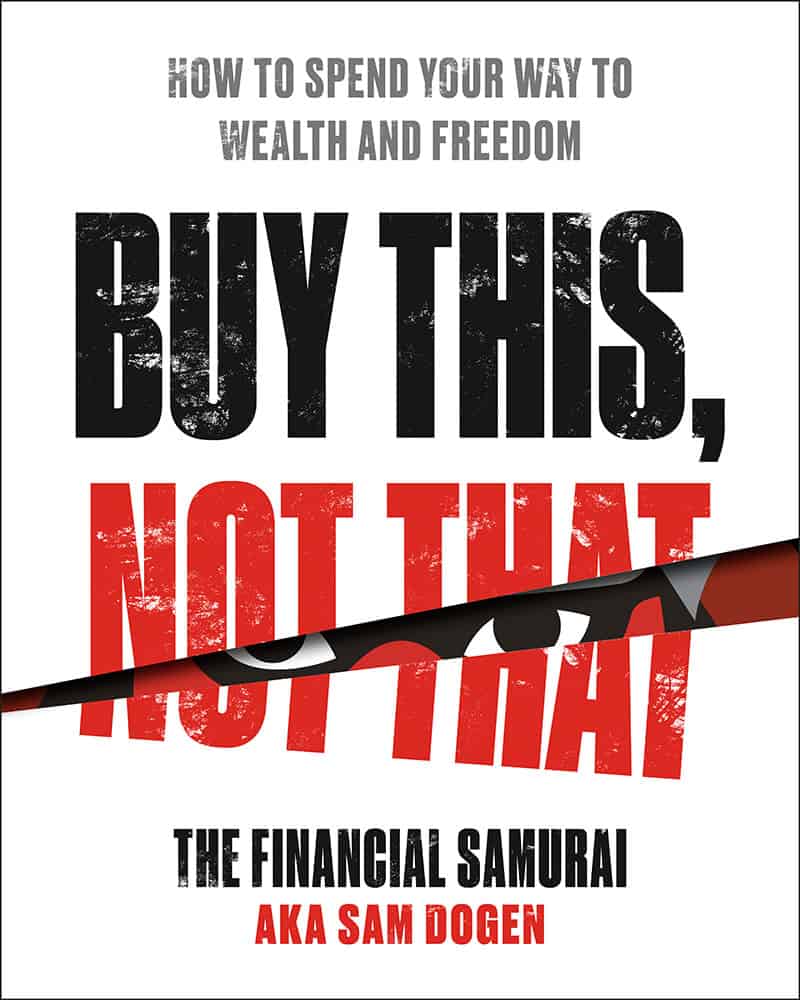 Life is rarely black-and-white, yet we need to make definitive choices all the time.
Life is rarely black-and-white, yet we need to make definitive choices all the time.
- Rent this house or buy that apartment?
- Invest in a growth stock or an index fund?
- Live in San Francisco or Raleigh?
- Join a start-up or work at an established firm?
These choices all involve an expense of time and capital. Each choice brings risk and reward. The problem is that most of the time we don’t have enough information to confidently choose this or that. My approach helps you overcome this information gap.
You do this by thinking in probabilities instead of in binary terms, where it’s an all-or-nothing proposition. If you start thinking in probabilities instead of absolutes, you’ll develop a stronger analytical mindset to make more winning decisions over time. You’ll also be able to make more winning decisions on risks that others never dare take.
Positive-Expected-Value Decisions
One of the biggest decision-making fallacies people fall victim to is thinking they must take action only when there’s 100% certainty of success. Here are two examples.
- Only if you are certain someone likes you — because they told their friend, who told you — do you feel confident asking them out. But you might find out years in the future that they liked you as well and were just waiting on you to make the first move.
- Most people put in an offer on a house only once it’s listed for sale. But at any given moment, there may be several homeowners in your neighborhood looking to sell, unsure whether they want to go through the hassle of listing their property. By sending out friendly letters of interest, you could very well start a dialogue and end up buying one of the most coveted houses on the block for a good price.
Your goal is to constantly make positive-expected-value decisions in everything you do. A positive-expected-value decision is when you have a greater than 50% probability of your desired outcome coming true.
Some decisions have higher expected values than others, such as accepting a job offer with a guaranteed raise and promotion with a growing company known to cut costs. Some decisions, on the other hand, have murkier expected values due to an overwhelming amount of incomplete information.
It’s up to you to do your due diligence to bring your probability of success as close to 100% as possible (while also accepting that very few decisions ever have 100% positive outcomes). There are few sure things in life. So think in probabilities.
The more important the decision you need to make, the higher the edge or positive expected value you should have.
The 70/30 Framework
Now that you understand the importance of making positive-expected-value decisions, let me introduce you to my 70/30 philosophy in decision-making.
The 70/30 framework states that you should seek to make a decision only if you have at least a 70% probability of making an optimal decision. At the same time, have the humility to understand that 30% of the time, you’ll make a suboptimal decision and have to live with the consequences.
With more than a two-to-one reward-to-risk ratio, over the long run you’ll become very profitable with this decision-making strategy. You’ll most certainly have regrets where you’ll wish for do-overs. However, you’ll also constantly be learning from your mistakes so that you can make even higher positive-expected-value decisions in the future.
But don’t get cocky. That’s when you’ll run the risk of financial and personal ruin. Being overconfident and not properly recognizing risks will be your downfall. The worst mistake you can make is not realizing when a good decision was mostly due to luck, not skill. Proper risk management is paramount.
Expert marketing has also made so many things seem like attractive products, experiences, or investments. But of course, not everything you spend money on or invest in turns out to be as great as expected. Therefore, it’s up to you to continually hone the accuracy of your predictions so that they aren’t too far from reality. If your predictions are way off, it’s imperative that you study why — and make adjustments.
How to Improve Your Forecasting Abilities
The best way to improve your forecasting abilities is to constantly make predictions about uncertain outcomes. For example, if you watch any type of sporting event, before the game starts, make a forecast of who will win, by how how much, and why. Jot your forecasts down to keep yourself honest. Then compare the outcome with your expectations and see what you go wrong and why.
You can practice improving your predictions on practically any type of activity that has an uncertain result. You can make forecasts on:
- which dog will win the dog show
- how long a friend’s relationship will last
- how much a house will ultimately sell for and by when
- how long your injury will take to heal
- how many times you’ll test for COVID until your results are negative again
Soon you’ll start to naturally see everything as a probability matrix. Where others make decisions based solely on gut instinct, you’ll go into every decision-making process based on extensive practice, logic, and self-awareness. This is your competitive advantage.
When you’re dead wrong, you must review the reasons why and learn from them. Eventually you’ll narrow the gap between various outcomes and your expectations to the point where you can confidently say something has at least a 70% probability of succeeding. If you feel your desired outcome has more than double the chance of coming true over the undesired outcome, you’re on the right track.
Buy This, Not That is not only a book about achieving financial freedom sooner, it’s also a book about making optimal choices for some of life’s most important decisions. For each decision, I’ll present to you the rationale for why I think you should go a certain way based on what’s best for your particular circumstances. My reasoning is based on my own experience, my background in finance, and the perspectives of more than 90 million people who’ve visited Financial Samurai since 2009.
Not everything will turn out according to plan. We must embrace this truth. However, so long as you continually learn from your mistakes, your decision-making skills will surely improve over time.
Get on the Damn Bus
 Buy This, Not That isn’t only about optimizing your choices; it’s also about optimizing your attitude.
Buy This, Not That isn’t only about optimizing your choices; it’s also about optimizing your attitude.
I came to America with my family from Kuala Lumpur. I was born in Manila while my parents, who worked for the U.S. Foreign Service, were stationed there. We lived in Zambia, the Philippines, Virginia, Japan, Taiwan, and Malaysia, in that order, before coming to northern Virginia when I was fourteen years old. At the time, only about 6% of the population in our town looked like me. It was quite a shock going from being a part of the majority to being a minority.
I had to start over and find new friends while also navigating encounters with bullying and racism. I was also a misfit who lacked the ability to think quickly because my mind constantly bounced between English and Mandarin. My grades and SAT scores were unremarkable too.
I knew my parents weren’t rich. They drove beaters and frowned on ordering any drink other than water when we went out to eat. We lived in a modest townhouse in a grungier part of town. I never had a Nintendo. My Air Jordans were hand-me-downs from a friend and two sizes too large. We weren’t poor, but we never had more than what we truly needed.
After high school, I attended William & Mary, a public university in Willamsburg, Virginia. We couldn’t afford a higher-priced school, and I wasn’t smart enough or athletic enough to get scholarships. I did well enough at William & Mary, but that’s not how I ended up getting a job at Goldman Sachs after college. The only reason I got a job at Goldman Sachs was because I got on a 6:00 a.m. bus one chilly Saturday morning.
The bus was heading from college to a career fair two hours away in Washington, D.C. Twenty other students signed up to attend, but I was the only person who showed up. After waiting over an hour for the no-shows, the bus driver took me to his company’s headquarters, swapped out the bus for a black Lincoln Town car, and personally chauffeured me to the fair. This was the first time I realize that just showing up is more than half the battle.
Seven months, six rounds, and fifty-five interviews later, I finally got the job at One New York Plaza, Goldman’s equities headquarters. All because I showed up and stuck with it.
Never in my wildest dreams did I imagine I could leave the corporate grind at age thirty-four to focus on my life’s passions. But thanks to Financial Samurai and my investing efforts, I’m now forty-five and financially free to spend time with my wife and two kids, and to work on the things I love.
One saying keeps me going whenever things are hard and I feel like making excuses: “Never fail due to a lack of effort, because effort requires no skill.” I can fail because the competition was too good, or because an unforeseen event knocked me off my feet. But if I fail because I just didn’t try hard enough, I know I’ll be filled with regret as an old man.
Grit, consistency, and confidence are by far the most important attributes for achieving your goals. Don’t think you need to have special skills, innate talent, or rich parents to get ahead. Who you are is good enough already.
Hello, friends! I have a lot to say, and I’ve done a lot of work on Get Rich Slowly during the past three weeks, but most of my efforts aren’t yet ready for public consumption.
- The site de-design is 95% complete, but that final five percent is fiddly. I could be ready to launch the new layout tomorrow — or it might be two weeks. It’s tough to say. If you’re curious, though, you can check out my current progress here. But be warned that the site isn’t fully functional. (For fun, I mocked up this very post in the new format so you can see the difference.)
- I have several long articles in the works — quality! the internet is dying! the sunk-cost fallacy! — but nothing that’s wholly finished. And with my attention more focused on the de-design and Real Life than on writing, it’ll probably be a while before anything is complete enough to publish.
Still, I thought it’d be fun to stop in with a J. Money-esque stream-of-consciousness post to share a some cool projects from some of my friends.
Speaking of J. Money, let’s start there.
Bringing Sexy Back
I know that there’s a huge crossover between folks who’ve been reading Get Rich Slowly for a long time and folks who loved Budgets Are Sexy before J. Money left the site. Well, guess what? J. Money is bringing sexy back. That’s right: J. Money has re-purchased the site, and he’s begun publishing new stuff regularly. Yay!
In other blogging news, I’d like to share my current favorite read: Money and Meaning from my buddy Douglas Tsoi. Douglas and I met a few years ago and have formed a solid connection. He’s a deep thinker, and I like that.
Douglas and I presented a financial workshop together at World Domination Summit in 2019. I bought his 1993 Toyota pickup from him at the end of that year. (Boy, does Kim hate having that thing parked in front of our house!) And in February of this year, he launched Money and Meaning through Substack. It’s truly terrific. You should check it out.
Cashing Out
You know what else is terrific? Kiersten and Julien Saunders from the rich®ULAR blog have published their new book, Cashing Out. I no longer review friends’ books at GRS (because that’s truly a Kobayashi Maru), but I will say this: I read an advance copy of Cashing Out and thought it was great.
Here’s what I wrote to Kiersten in Julien in February after reading their book:
K&J,
I deeply appreciate that your book isn’t just a re-hash of the same stuff everybody has already said. You go deeper. You talk about society, culture, relationships, and psychology. I believe this stuff is far more important than merely mastering the mechanics of money. The mechanics are simple. (They may not be easy, but they’re simple.) These other things are what make money management complicated, and they’re too often ignored. You’ve written an excellent book, and I’m happy to help promote it.
Anyhow, here’s what I came up with for a blurb. I hope that it’s useful.
“Cashing Out is important and inspirational. Kiersten and Julien avoid the B.S. that plagues most money manuals, opting instead to provide readers with the knowledge and confidence necessary to save, invest, and — in time — cash out by cashing in on the American Dream. Highly recommended.” — J.D. Roth, founder Get Rich Slowly
Thanks and good luck, my friends!
–j.d.
Taking Stock
Speaking of books, I’m excited that my friend Doc G is close to releasing his book, Taking Stock. It’ll be out on August 2nd.
For those unfamiliar, Doc G (a.k.a. Jordan Grumet) is a hospice doc who also hosts the excellent Earn & Invest podcast. He and I roomed together at a past Camp FI, and we’ve had several terrific discussions over the years. (Near the end of my cousin Duane’s life, Doc G helped talk me through what was coming next.)
Here are two videos promoting Taking Stock: the book trailer, and a conversation between Doc G and Grant Sabatier. (Note that despite my best intentions and ample opportunity, I still have not read this book. Sometimes I am a bad friend. 🙁 )
Oh, and speaking of Grant Sabatier (notice how one subject is naturally leading to another here? crazy!), earlier this year he partnered with The Motley Fool to produce a course called Financial Freedom in Uncertain Times. I’m honored to have been one of the folks interviewed for the project, along with Doc G, Kiersten & Julien, Jamila Souffrant, Stefanie O’Connell Rodriguez, Bola Sokundi, and Amanda Holden.
Again, I haven’t had time to work through the course, but I’ve talked with Grant extensively about it, and I know that our interview was deep and insightful. I suspect the course contains quality material, and I do hope to dive into it in the future.
Buy This, Not That
While we’re discussing the future, I should mention the upcoming book from Sam Dogen, a.k.a. The Financial Samurai. Sam is a polarizing figure in the world of personal finance, and I get that. But even when I disagree with him, I find his writing thought-provoking and often truly insightful.
Sam’s new book is called Buy This, Not That and it comes out on July 19th. I haven’t read it yet — the postman legit placed a preview copy in my hands three hours ago — but I plan to do so after I finish Doc G’s book.
During a recent email exchange, Sam had this to say about Buy This, Not That:
The book is more than just trying to achieve financial independence. It’s also about how to make more optimal decisions to live your best life possible. […]
I read a dozen books as research before writing my book. I wanted to see what worked and what did not. And the key missing elements from many of the good books were specific action items and frameworks to follow based on different situations. I also wanted to write about a decision making framework on how to tackle some of life‘s biggest dilemmas. Real life stuff that go beyond money.
As a side note, my brother used Eat This, Not That to help him figure out food and lose weight. For a long time now (since the beginning of GRS, I think), I’ve wanted to do a similar “Buy This, Not That” series on the blog, but never figured out a way to make it work. I’m glad Sam has.
Little Miss Evil
To close things out today, I want to mention something fun. I’m sure many of you are familiar with Bryce and Kristy from Millennial Revolution, which is one of the few money blogs I still read regularly. Well, these two don’t just write about money. Several years ago, they also published a kids’ book called Little Miss Evil.
I’m reading Little Miss Evil right now and it’s a heck of a lot of fun. I love the core idea: What’s it like to grow up with a super-villain for a father? A super-villain who uses a nuclear bomb for a coffee table?
I always enjoy seeing my personal finance friends do other stuff — making art, producing music, climbing mountains, brewing beer — and that’s certainly true in this case.
Okay, that’s it for today. I didn’t intend to spend two hours writing about all of these things, but hey — it’s stuff I’ve been meaning to share. Maybe you’ll enjoy one or more of these projects from my friends.
Oh, one last thing: Old comments are really, truly gone. That’s right: More than fifteen years of comments here at Get Rich Slowly have vanished into the ether.
Well, that’s not wholly correct. The comments still exist in the database, but for some reason they have all become disconnected from the articles they belong to. We have no idea how it happened, and there doesn’t seem to be a way to fix it. I’m bummed, as you can imagine. It’s a huge, huge loss. But neither Tom nor I can come up with a solution to restoring them.
Interest rates on home mortgages are rising rapidly across the United States, which seems to be slowing most housing markets. (Some, like the market here in Corvallis, have been less affected. Give it time.)
The average mortgage rate for a 30-year loan was about 3.0% at the start of the year; today, it’s at 6.245% — even for somebody with an excellent credit score over 800.
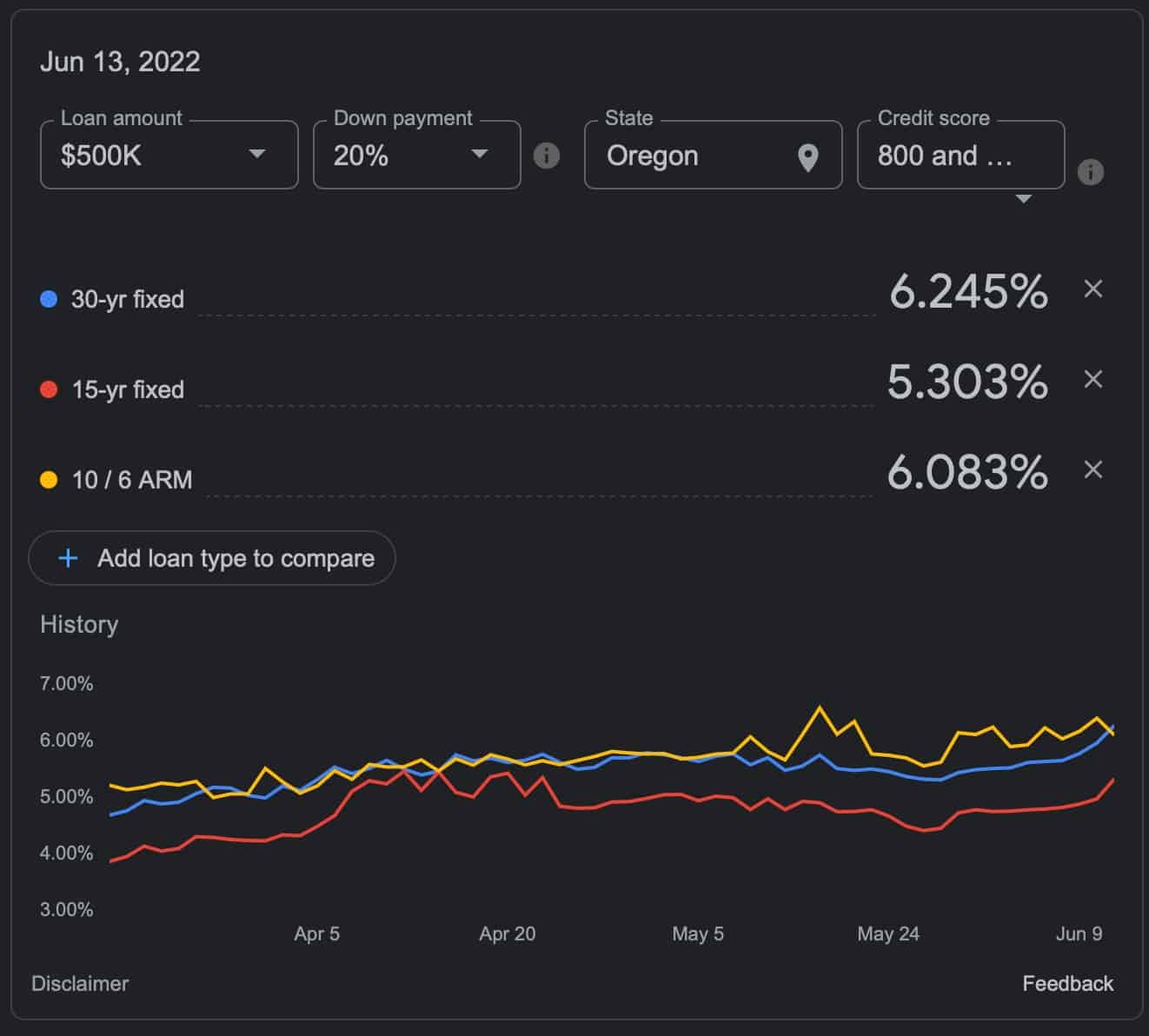
Kim and I are fortunate that we bought our home in 2021 instead of waiting until 2022. Mortgage rates weren’t actually a factor during our deliberations last year; the historically low rates were simply an added bonus for buying when we did.
When we purchased our home last August, we took out a $480,000 mortgage at 2.625%. We didn’t hit the precise bottom of the mortgage market (that was early January 2021, when we might have had a loan for 2.5%), but we came close.
Here’s a chart from the Federal Reserve that shows mortgage rates from the past 2.5 years.
And here’s a chart that shows mortgage rates for the past 50+ years:
Mortgage rates have hovered at historic lows since the Great Recession of 2007-2009. And rates fell even further during the COVID pandemic. (These low rates are partly responsible for the blazing-hot housing market of the past two years.)
What do these rising mortgage rates mean to actual home buyers? Let’s use our situation as a representative example.
Rising Rates Decrease Buying Power
Last August, Kim and I closed on our home here in Corvallis. It’s a 1964 behemoth for which we paid $680,000. With a $200,000 down payment, we managed to get a 2.625% APR on a 30-year loan. We pay $1929.33 each month for principal and interest. (Our actual mortgage payment, including taxes and insurance, is $2528.43 per month.)
Today, that same loan would cost us 6.245%. If we wanted to buy this same house at the same price with the same down payment, our monthly payments for principal and interest would be $2956.04 — an increase of over $1000 per month compared to buying a year ago!
If we were shopping for homes today and wanted to keep our mortgage payment the same — $1929.33 per month — we’d have to lower our sights. Instead of taking out a $480,000 mortgage on a $680,000 home, we’d be looking at a $313,500 mortgage on a $513,500 home.
But wait! That’s not all! Home prices in our town have risen 10% during the past year, so that would further compromise our buying power. If we had waited until now to buy and wanted to keep our mortgage payment at $1929.33, we’d be shopping for homes that cost $467,000. Delaying a year would have decreased our buying power by $213,000 — over 30%.
While low mortgage rates didn’t spur us to move last year, they certainly gave us an incentive to act quickly. Conversely, if we had waited until this year, I’m not sure what we would have done. Knowing me and my aversion to onerous debt, I probably would have been reluctant to take out a mortgage. I would have tried to find a home to buy with cash, limiting my options even further.
When mortgage rates are at crazy lows like 2.625%, I don’t think twice about carrying a mortgage. It’s a no-brainer. I want a mortgage on my home every single time, and I never want to pay it off. A rate of 2.625% isn’t free money (and I don’t want to pretend that it is), but it’s pretty damn cheap. The gap between expected long-term stock returns (6.8%) and our mortgage rate (2.625%) is huge. There’s a lot of room there, a big margin for error.
On the other hand, there’s almost no gap between a rate of 6.245% and expected market returns of 6.8%. There’s no margin for error. I’m wary of borrowing money at this rate, especially such a large amount. I’d rather not have a mortgage with rates this high.
What Does the Future Hold?
I expect that rising interest rates will have their intended effect: They’ll cool the blazing-hot housing market. Will prices drop? Probably. But who knows? It’s clear, though, that a shift is coming.
I have a handful of friends who are real-estate agents. If you too have real-estate agent friends, then you know that they tend to be permabulls when it comes to their industry. They have an unflagging belief in the future of home prices. But even my real-estate friends believe some sort of shift has begun.
Here’s a long (and interesting) Facebook comment from one of my real-estate friends:
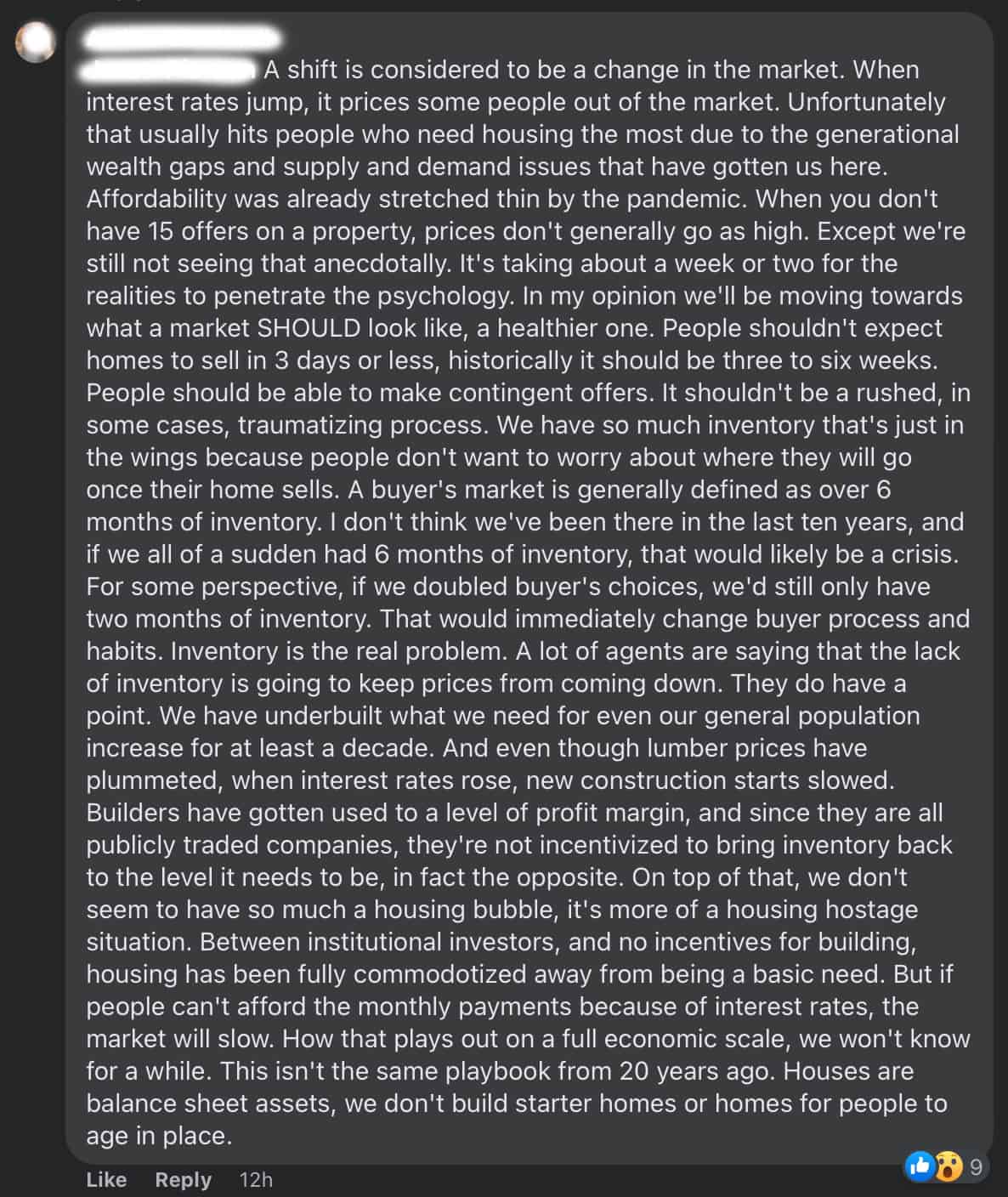
Last year, home prices were high, but those high prices were mitigated by super-low interest rates on home loans. Now you’ve got a double whammy: high prices and high rates. Today seems like an especially poor time to purchase a home. That’s not a good combo.
I feel sorry for folks who absolutely must move right now. They’re getting screwed.
A couple of weekends ago, Kim and I enjoyed a short vacation on the Oregon Coast. She’s been taking foraging classes, and she had an early morning workshop on harvesting sea vegetables one Sunday. Rather than wake in the middle of the night to drive out, we rented a small place in Tillamook and took the dog for an adventure. (The dog loves the coast.)
We let Tally lead us on a walk through town one rainy afternoon. Coming home, we cut through a trailer park. “We’re in the poor part of town,” Kim said.
“Yep,” I said. “But look at that trailer house right there. That is almost exactly like the one I grew up in.” Here’s the trailer I grew up in:

We stopped to look at the trailer. I pointed out the tiny windows and the sagging roof. “It’s small,” Kim said, frowning.
“Yes,” I said. “Yes it is.” The trailer was a beat-up 1970-era single-wide. Nothing about it looked appealing. I could imagine the inside: shag carpet, thin wood paneling on the walls, faded linoleum, colors like Avocado and Harvest Gold on every surface.
If you’ve been watching Stranger Things season four, as we have, the trailer houses in that show remind me of ours too. Look at this mobile home from Stranger Things; it’s very, very similar to the one my parents owned:
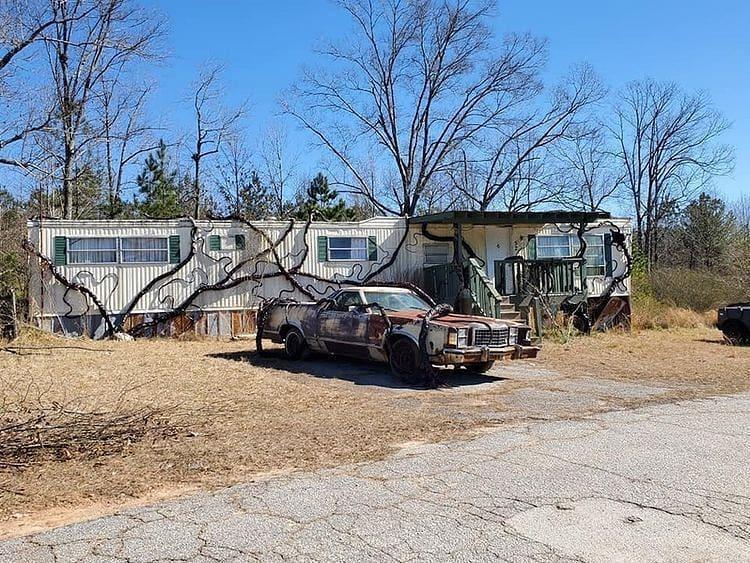
Everything about that image feels like my childhood to me. (Well, except for the demonic tentacles wrapped around the house and car…)
Growing Up Poor
I’ve talked before about how my family was poor when I was young. When he was working, Dad didn’t make much money — but he was often out of work. Mom bought our clothes from the discount rack. There were times we relied on the church “relief society” for food. Mom and Dad often tried to make our situation seem like an adventure (“Kerosene lamps are fun!” “A wood stove provides more heat than a furnace!” “We don’t need a TV! TV rots your brain!”) but in retrospect, I know now they were doing whatever they could to make ends meet.
There was indeed a brief time when Mom and Dad had money coming in. Dad started a business in 1976 that slowly grew into a profitable venture. When he sold that business in 1980, though, the buyer went bankrupt after making only one payment. Poof! There went Easy Street. And, of course, when Mom and Did did have money, they spent it. They never ever saved or invested.
It wasn’t just my mother and father either. My Dad’s entire family was poor. (My mother’s family was not, but we had little contact with them.)
My cousin Duane’s family, who lived about ten miles from us, was poor too. They had a big old drafty house instead of a trailer, but they also struggled to get by. His mother and father, like mine, were all about self-sufficiency. They grew their own food. They hunted. They fished. They built what they could by hand.
Duane loved to tell the story of how his father once refused to buy washers at the hardware store because they were too expensive. They cost seven or eight cents, or maybe a dime. Instead, Uncle Norman went home and drilled holes through nickels to make his own washers.
My father’s sister and her family were just as poor as the rest of us. They lived up in the foothills outside Estacada in another big old drafty house. They needed a big house because there were nine children in the family. When I see movies featuring poor country folk from the 1930s, their circumstances often remind me of Aunt Virginia’s bunch. (Long-time readers will recall that I’ve shared some stories from my aunt’s family here at GRS in the past: “A Six-Dollar Christmas” and “The Night That Mama Cried While Angels Sang”.)
Naturally, the poverty of these three siblings had a source: their parents. Grandma and Grandpa were poor too, although it didn’t seem that way when I was a boy. To me, Grandma and Grandpa were rich. Sure, their house was small. Sure, they lived simply. Sure, they grew much of their own food (in the form of gardens and livestock). Sure, they chopped their own firewood. Sure, they rarely bought anything beyond necessities. But their home and yard were always clean and tidy. And they could both make small things — oatmeal cookies, Bobbsey Twins books — seem like lavish luxuries.
Friends with Money
During my early childhood, our life seemed to revolve around the extended family. We spent holidays with Grandma and Grandpa and aunts and uncles and cousins. Outside of church, this was the only life I knew. To me, this was how the entire world lived. I had no conception that there might be anything else.
During those rare times I was allowed to watch TV, I saw different ways of living, of course, but these seemed like fantasy. Besides, the Cunninghams on Happy Days and the Bunkers on All in the Family didn’t have lives that seemed too far removed from ours — except that they lived in the city. (The Brady Bunch, on the other hand, blew my mind. Such a big house! Such nice things! They were rich, and I knew it.)
Eventually, I made friends and I started to visit my friends’ homes. Those friends who lived in the country sometimes lived in the same circumstances that we did, but many did not. Many had bigger homes, nicer homes, cleaner homes. (You would not believe me if I described how dirty and cluttered our house was when I was young.) And my friends who lived in town? Well, there was no question in my mind that they were rich.
I remember going to an overnight birthday party in town when I was in fourth or fifth grade. My friend’s house was huge. It was modern. He had so many books and toys. His parents had new, fancy cars. They ate in restaurants. They could afford to take the entire birthday party to pizza! Looking back, it’s probable that this friend’s family was only middle class, but in 1980 they seemed rich to me.
As I entered middle school and high school, the differences between our circumstances and those of my classmates became even more apparent to me. Again, not all of my peers were rich. Some were poor like us, and they tended to become my friends. But I have vivid memories of my first experiences in the homes of rich people, and of how these rich kids carried themselves.
Once during high school, for instance, I went over to a friend’s house after play practice. (We were rehearsing You Can’t Take It With You.)
My friend’s father was a dentist — my dentist. Their house, located on the shore of the Willamette River, was enormous. It was so big that there was an actual tree growing in the center of it. It was a smallish tree, but it was still a tree. My friend and her brother each had their own computer. They each had their own television. The family had so much. I was in awe.
During high school, I had brief encounters like this with wealth and wealthy people. In each case, I felt out of place. I felt dirty. I felt like an impostor.
It was also about this time that I began to notice a difference between the rich kids and the poor kids like me. The rich kids exuded confidence. When they wanted something, they asked for it — or they took it. We poor kids were much more timid. We never took anything, and often we were afraid to ask for what we wanted. We were rule followers. My rich friends were not. They behaved as if rules were meant for other people. (Inevitably, it was my rich friends who got into trouble. Just as inevitably, their parents bailed them out.)
A Higher Education
I awakened to the difference between rich and poor during my teenage years. And I awakened to the knowledge that my family was poor. I began to think about my future. I never explicitly thought, “I want to be rich” or, “I don’t want to be poor.” Instead, I thought, “I don’t want to live in a trailer house when I grow up.” It seemed to me that the best possible escape route was college.
Fortunately, I was smart. I didn’t particularly apply myself to my studies, but I didn’t need to. I coasted through high school with a 3.29 GPA with zero effort. I never had homework (I finished it in class or during lunch) and I never studied for exams. I did phenomenally well on standardized tests. I could write well. I participated in a wide range of activities. In time, I was accepted to every college I applied to (although, admittedly, I didn’t cast a wide net). And one school, Willamette University, offered me a full-ride scholarship based on my test scores and extra-curricular activities.
College was a shock. I was discomforted by my rich friends in high school, but that was nothing compared to the wealthy kids I met in the dorms. These kids had nice clothes, nice cars, and (seemingly) no cares. Again, they had so much confidence. They acted as if the world was made for them. How did they do it?
One of my friends, for instance, had a new BMW that his parents had bought him for high school graduation. His father was a doctor. My friend (and his sister, who also attended Willamette) weren’t especially smart. In fact, they were kind of dumb. I tutored both of them at different times, and was always amazed by how little basic knowledge they possessed, and by how poor their study skills were. They didn’t get into college on merit. They got into college because their father with deep pockets was an alumnus.
My friend and his sister sailed through college with poor grades and a rich social life. They were active in their Greek organizations. Their parents gave them money, which they promptly wasted on drugs and alcohol. To them, college wasn’t about studying. College was about making connections.
I know it sounds as if I have negative feelings toward these two friends, but I don’t. I loved them both. I have only fond memories of them. But there’s no question that they were rich kids who acted like rich kids.
Once during my freshman year, I visited my friend’s house. It was like a palace to me, and I said so. My friend was offended. To him, his house was a house. He took it for granted. But the place was enormous. It was opulent. I remember standing in front of the floor-to-ceiling wall of windows that looked out over the valley below us and watching the sun rise. I’d never experienced anything like that before.
At the end of my freshman year, I began dating a woman from Portland. Amy was terrific, and so was the rest of her family. But again, their life was outside my realm of experience. They owned a big old home in a nice part of town. Her father was a real-estate agent who owned several rental properties, including the building where he had his office. Amy’s mother (who couldn’t remember my name, so she called me “The Initials”) was a wonderful woman who was interested in the arts and philanthropic organizations. “Your family is rich,” I told my girlfriend once. She was offended, but it was true.
I had many experiences like this during college. In time, I became numb to them. I would visit a friend’s childhood home, and it would look nothing like what I had grown up with. Always always always, I felt out of place. I didn’t know how to behave. I didn’t know what to do or think or say when in the presence of such wealth. But all of my friends seemed to fit in fine. They’d grown up in this world, and they knew its unwritten rules.
This is no small thing.
The Mental Side of Money
I’ve been fortunate in life. When we were married, Kris and I started with modest means. We lived in an apartment. Before long, we bought a standard ranch house near the high school where she taught physics and chemistry. We weren’t rich but we were certainly middle class. In fact, by the time my father died in 1995, Kris and I had a home and lifestyle that surpassed what Mom and Dad had ever been able to achieve.
Dad’s box factory did eventually allow him to escape poverty, but he didn’t live long enough to truly enjoy it. And Mom’s health declined before she could enjoy the change in financial fortunes either. Today, the box factory pays for her memory care and medical bills.
As an adult, my experience has been markedly different than when I was a kid. I’ve gradually moved from poverty to middle class to upper middle class. In the physical world, I am now rich. But inside? In my internal world? I’m still that poor kid living in a trailer house. Foolish though it may seem, I am trapped by those thoughts and those emotions. They guide my decisions (often at an unseen level).
I still lack confidence. I still feel like I don’t deserve anything that I have. I still expect it all to vanish, to go away. I find it difficult to defer gratification. Intellectually, I understand that if I want to purchase something, I can do so any time I need to. I can wait. Emotionally, however, I feel like I have to buy things now because the opportunity may never arise again. It’s irrational, I know, but that’s how it is.
Last week, I had a conversation with a new friend here in Corvallis. I was talking about how frequently Kim and I have moved during our ten years together, and about how we’re ready to stay in one place. “In retrospect,” I said, “we probably should never have sold our condo in Portland. It was a beautiful place. It was the best unit in the building: top floor, on the corner, with a view that looked over the river toward downtown. It was, by far, the nicest place that I have ever lived.”
“So why did you move?” my new friend asked.
“There were a couple of reasons,” I said. “We acquired pets, for one. We had two cats and a puppy, and they didn’t do well on the top floor of an apartment building. Plus, the crime and traffic and homelessness in our neighborhood had become overwhelming. But if I’m being honest, I think the main reason I sold the place was because I felt like I didn’t deserve it.”
“What?” my friend said, shocked. “Didn’t deserve it?”
“I’m serious,” I said. “I’ve never really thought about this before, but it’s true. During the four years we lived there, it never felt real. It felt like a dream. It felt like the place was too good for me. I felt like I didn’t deserve it. I felt like an impostor.”
She and I then had a long discussion about coming from a poor background (because my new friend grew up poor too) and how poverty can mess with your mind, can lead you to conflate wealth with self-worth.
On a whim, I just looked up our old condo unit on Zillow. It just sold again two months ago! I bought it for $342,000 in 2013. It sold for $737,000 two months ago today. I think you can get a sense of just how posh the apartment was.
The Green-Eyed Monster
All of this rambling was inspired by a post I saw yesterday on the /r/fatFIRE forum on Reddit.
For those unfamiliar, /r/fatFIRE is a judgment-free place for rich people to talk about rich people problems. These are folks worth $5 million or $10 million or $100 million. Generally speaking, I do not begrudge these people their wealth. (I’ve never been one to envy the wealthy, actually. I’m not an anti-billionaire, “eat the rich” kind of guy.) That said, this question triggered some deep-seated issues inside me:
Our child is going a private four year east coast college. We are FAT but trying not to spoil him. All of our trusts are confidential and completely discretionary. He went to a private high school but does have a summer job. I want him to enjoy school and studying. What is a reasonable allowance per month for him? 529 will cover most of her other costs (housing, travel, books, etc). I don’t want him to be the spoiled trust fund kid that I hated in college.
Besides being unclear on this child’s gender (him? her? why does the poster use both?), I was floored by this question. I’m not so much floored by the idea that a kid’s parents might pay for their entire education — I’ve seen that plenty — as I am by the entirety of what’s going on here: private high school, trust funds, a college allowance.
An allowance in college? Are you kidding me?
I’m serious: Even after a day to think about this, I still can’t get over the concept. Do you know how much money my parents directly contributed to my college experience? Zero dollars. And I knew that’s how it was going to be, which is why I pursued scholarships and grants and why I worked several jobs concurrently to have spending money. But it’s not just that this Reddit question is far removed from my own life; it’s also that I think it’s a terrible, terrible idea. (My own experience has shown me just how spoiled kids like this can get. The Millionaire Next Door, though, backs this up with data.)
But what if I’m simply being jealous? What if I’m not flabbergasted; what if I’m actually envious? Does this situation get me riled up because I wish that I’d had the same advantages? And what if I had enjoyed the same advantages? What would I be like then? Would I have turned out spoiled too? Is the confidence I see in wealthy people produced by being spoiled? I don’t know.
My mental health, which was woeful for several years there, has improved considerably during the past twelve months. (There are a variety of reasons for this.) All the same, I still suffer from some of the same core problems that have plagued me my entire life: lack of confidence, poor self-esteem, rotten impulse control. I look at my peers and they all seem to have their shit together. They’re poised. They have direction. They act with purpose. Not me!
I can’t say that growing up poor is the sole source of my hang-ups. Part of the problem is simply my genetic makeup, I’m sure. Part of the problem comes from the fact that my parents, who did the very best they could, weren’t able to impart certain fundamental skills. Part of the problem stems from being picked on all the time during grade school.
But you know what? The older I get, the more I believe that many of my faulty mental models exist because I grew up poor.
What do you think? What’s your experience? Did you grow up poor? Middle class? Rich? How do you think your family’s financial circumstances during childhood affected who you are today? Are you richer or poorer than your parents? To you, do there seem to be differences between the choices and actions of the wealthy and the poor?
Last month, the Federal Reserve released a new report: Economic Well-Being of U.S. Households in 2021 [PDF]. This annual survey gauges American financial health and attitudes. The 2021 edition was conducted last November.
Here are some highlights from the report:
- Seventy-eight percent of adults were either doing okay or living comfortably financially, the highest share with this level of financial well-being since the survey began in 2013.
- Fifteen percent of adults with income less than $50,000 struggled to pay their bills because of varying monthly income.
- Fifteen percent of workers said they were in a different job than twelve months earlier. Just over six in ten people who changed jobs said their new job was better overall, compared with one in ten who said that it was worse.
- Sixty-eight percent of adults said they would cover a $400 emergency expense exclusively using cash or its equivalent, up from 50 percent who would pay this way when the survey began in 2013. (Note that this survey is the original source of this oft-quoted statistic.)
- Six percent of adults did not have a bank account. Eleven percent of adults with a bank account paid an overdraft fee in the previous twelve months.
These little nuggets of info are interesting, sure, but what I find even more interesting are the charts and graphs documenting long-term trends.
The Demographics of Economic Well-Being
Here, for instance, is a chart that shows how people feel about their current financial situation:
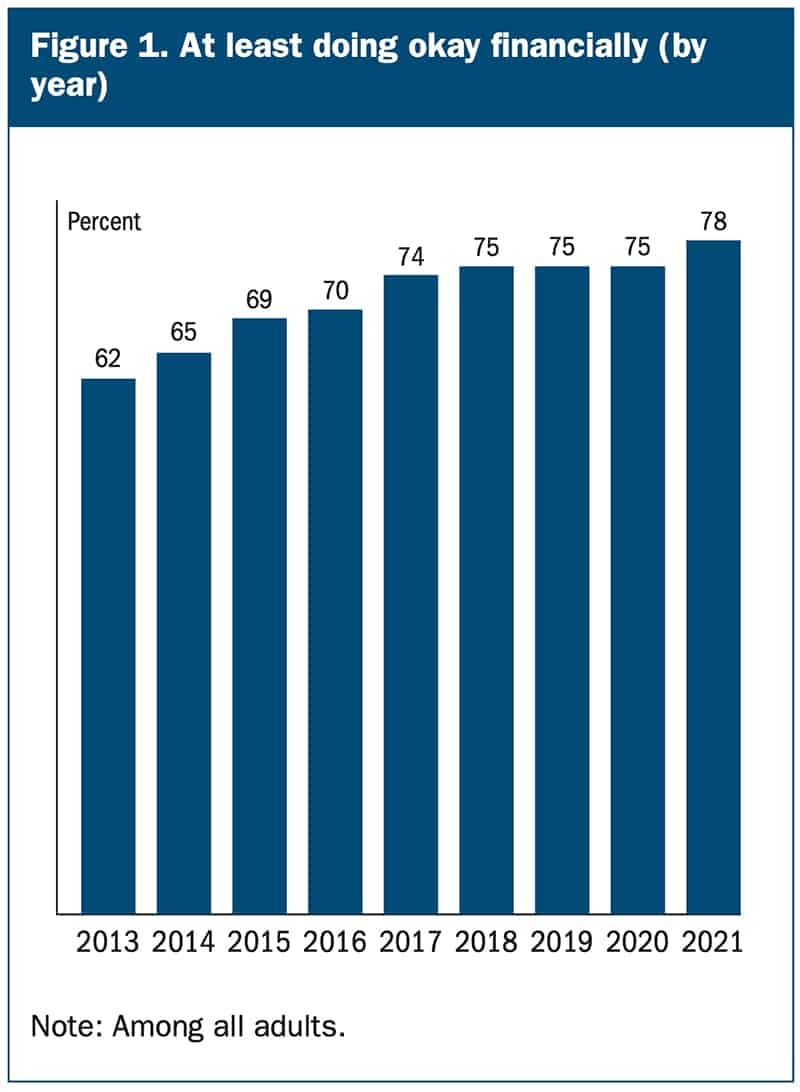
In 2021, 78% of adults in this country reported “doing okay” or “living comfortably”. That’s up significantly from when this survey started in 2013.
The next logical question, of course, is how different demographics feel about their financial situation. The Fed report offers some insight into that.
Here’s a chart that shows (once again) the value of a college degree).
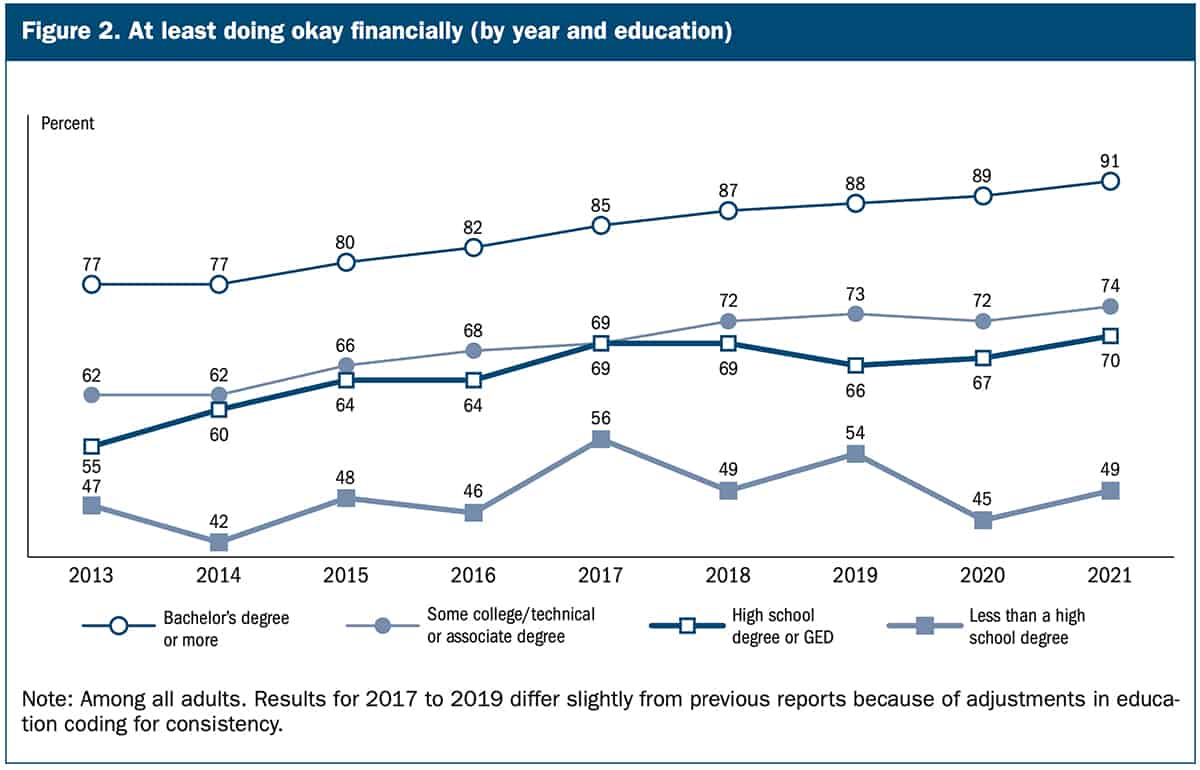
Although it’s popular in some corners to bad-mouth college degrees, according to the U.S. Census Bureau (and many other sources) your education has a greater impact on lifetime earning potential than any other demographic factor. Education matters more than age. Education matters more than race. Education matters more than gender. When it comes to making money, education matters most.
Next, here’s a chart from the Fed report that documents economic well-being by race and ethnicity:
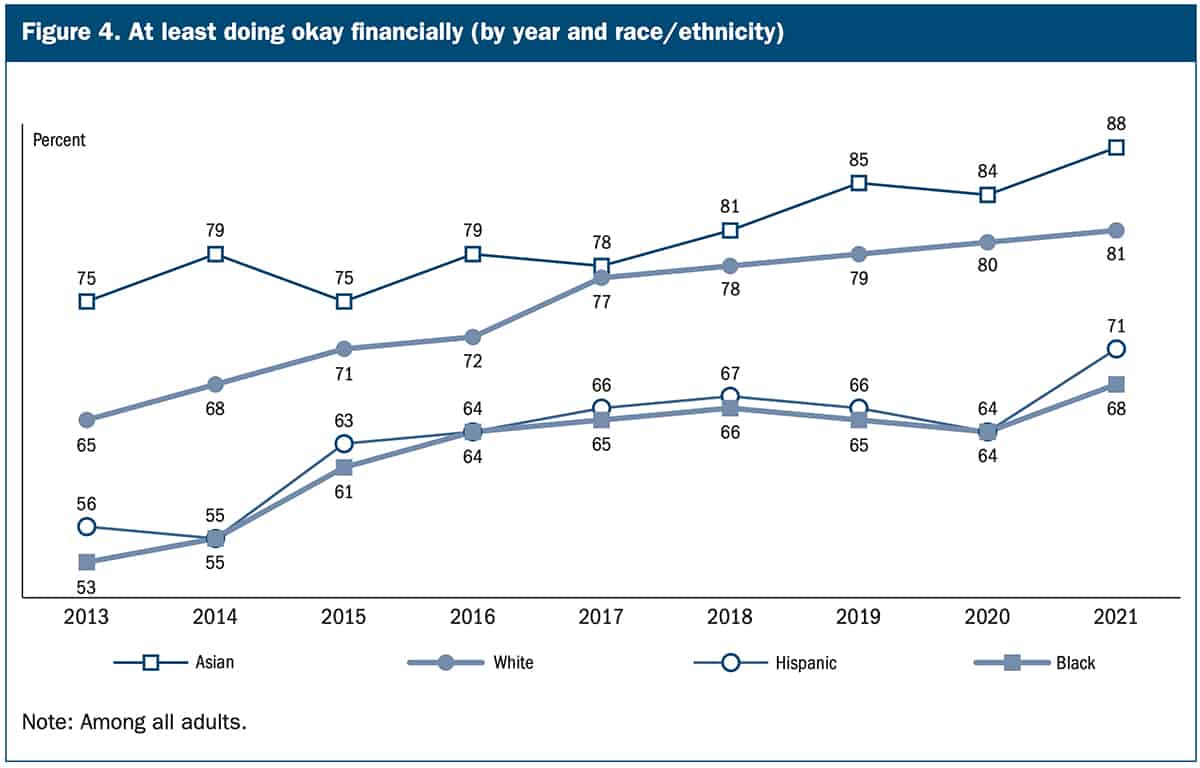
It seems that economic well-being has improved across the board during the past decade.
Personal Well-Being Versus National Well-Being
To me, however, the most interesting chart is this one, which compares respondents’ assessments of their personal well-being with their assessment of local and national economies. Look at this chart and tell me what you make of it. (I have an opinion, but I want you to develop your own hypothesis before reading mine…)
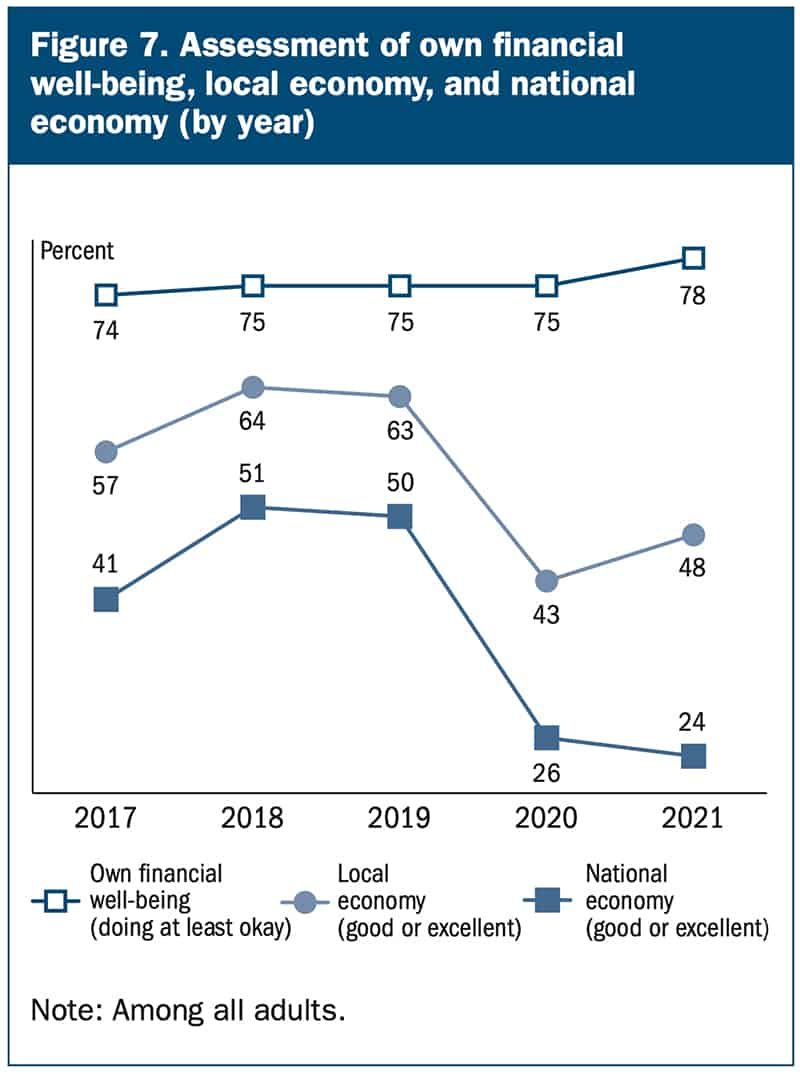
From the report:
Similar to people’s perceptions of their local economy, the share rating the national economy favorably fell precipitously from 2019 to 2020, after the onset of the pandemic ). However, people’s perceptions of the national economy continued to decline in 2021. Only 24 percent of adults rated the national economy as ‘good’ or ‘excellent’ in 2021, down 2 percentage points from 2020 and about half the rate seen in 2019. This trend contrasts starkly with people’s increasingly favorable assessment of their own financial well-being.
The Fed report tells us this discrepancy exists but it doesn’t tell us why it exists. Why do 78% of Americans say that their own financial situation is at least okay, but nearly the same number believe that the national economy isn’t doing well? I don’t know. But I can think of two possible reasons.
First, perhaps most Americans have learned to manage money. Perhaps they’ve been reading money blogs and listening to money podcasts, and now the lessons have sunk in. Maybe they’ve begun saving and investing wisely over the past fifteen years so that their personal economy is now protected from the gyrations of the economy at large.
Perhaps.
I harbor a suspicion, however, that there’s something else at play here.
Long-time readers know how much I abhor the news media. The mass media does not report reality. If you envision life as a bell curve (or “normal distribution”, if you prefer), the mass media tends to report solely outlier events — especially negative outlier events. The vast majority of our lives comprise normal, positive, healthy interactions and relationships and conditions. The news doesn’t report these.
In this case, I can’t help but wonder whether this disparity between perceptions of personal economic well-being and national economic well-being are driven (at least in part) by negative economic news, news that highlights the problems with our economy rather than the things that are going right.
That’s what I think. What do you think? What’s the reason for this gap in perception?
Final Thoughts
There’s much more data and insight in this 92-page report. I’ve highlighted only some stats from the first section on overall financial well-being. Other sections cover income, employment, unexpected expenses, banking and credit, housing, education, student loans, retirement and investments, and more.
I found the section on student loans interesting too. It contains a number of insights. Borrowers with less education, for example, are more likely to be behind on loan payments. This makes some sense, I think. Meanwhile, fewer people are behind on payments than two years ago (and this applies across all demographics).
Here, though, is my favorite chart from the entire report. It measures the self-assessed value of higher education:
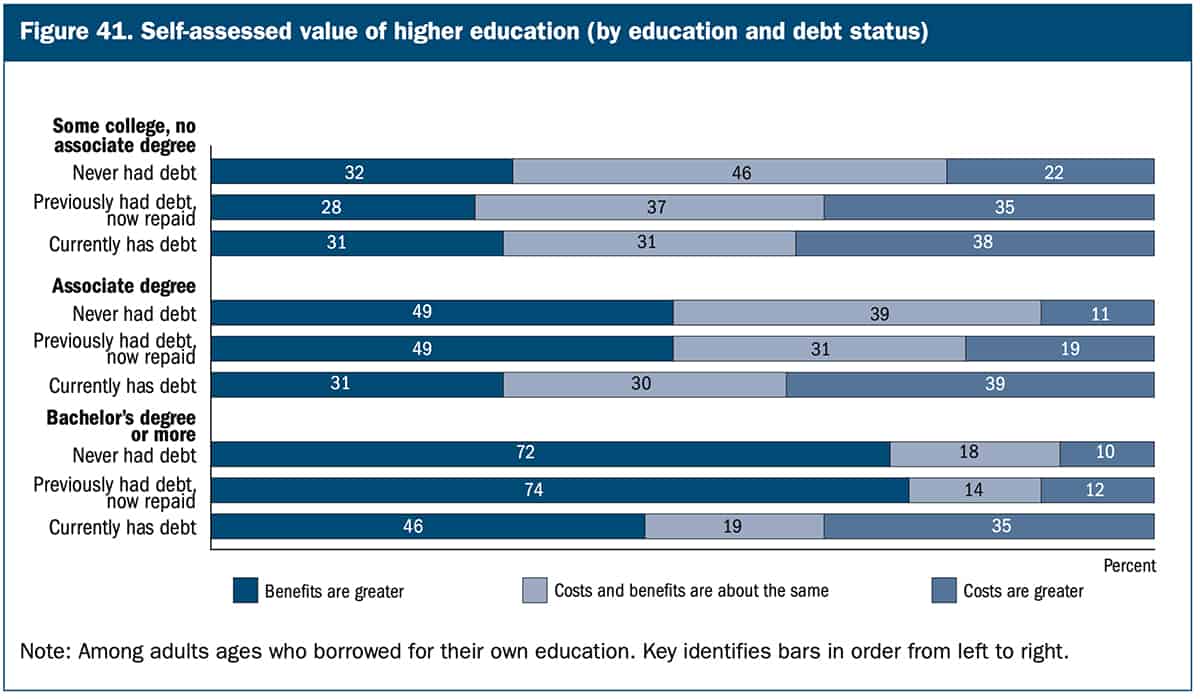
Two things seem clear here. First, folks who never had to borrow for college believe their education is worth more. Second, the more education one obtains, the more valuable it seems.
Okay, a third thing. Compare this chart with the one I shared earlier that highlights financial well-being by level of education. It’s clear that (objectively) education does improve financial health. But those who have student loans can’t always see that. Their subjective experience seems to contradict the data. Interesting…
Anyhow, the Fed’s Economic Well-Being of U.S. Households in 2021 is filled with interesting info. It’s worth reading (or skimming) the next time you sit down to waste time on the internet!
Both my ex-wife (Kris) and my current girlfriend (Kim) tell me I get too worked up about things sometimes. “You over-react,” they both tell me. Maybe so. I prefer to think of myself as passionate.
One of the things I’m passionate about is scammers. I hate them. Scammers are evil, evil people who prey on the most vulnerable members of society. They take advantage of social constructs in order to manipulate people into parting with their hard-earned money.
No surprise then that one of my favorite sub-genres of YouTube videos is “scammers getting scammed”. Scambaiters are modern-day heroes. As much as I despise scammers, I think scambatiers deserve high praise.
Today, I’ve collected together several YouTube videos (representing a couple of hours of viewing) that document, in an entertaining fashion, how scambaiters uncover scams, help victims, and are now actively working with law-enforcement agencies in an attempt to thwart the bad guys.
Scamming the Scammers
First up, here’s a year-old YouTube video from Mark Rober in which he shows how he managed to use one of his famous glitterbombs to catch a phone scammer, who was then arrested.
Rober didn’t do this on his own. He collaborated with some well-known YouTubers who specifically work to thwart scammers. Here, for instance, is Jim Browning’s video about the above incident: Catching Money Mules.
And here’s the Scammer Payback channel working with Rober. I like this video quite a bit, actually. It provides a lot of info.
But wait! That’s not all! Here’s another Rober video from a couple of weeks ago in which he documents his year-long quest to infiltrate the scam call centers in India in order to disrupt their operations (and, he hopes, to shut some of them down).
And let’s wrap things up with Kitboga as he trolls a scammer into spending ten hours with him, eventually goading the crook into losing his temper in a nuclear-level meltdown. It’s a thing of beauty. (Note, however, that the video is nearly ninety minutes long.)
I have zero patience for scammers. Zero. I believe they deserve the harshest possible punishments. But, as Rober mentions in one video, it’s like playing whack-a-mole. You put one scammer out of business and five more rise to take his place.
Aside
In one of his sequels to Dune, Frank Herbert wrote: “Between depriving a man of one hour from his life and depriving him of his life there exists only a difference of degree. You have done violence to him, consumed his energy.”Let’s extend this comparison. If time is money (or, more precisely, money is a manifestation of the time required to create it), if money represents “life energy”, as the authors of Your Money or Your Life put it, then depriving a person of her money is also only different from murder by a matter of degrees.
Further Reading
Want more info on scams and how to prevent them? Here are some intersting articles and useful resources I’ve found over the years:
- How to avoid a scam. [U.S. Federal Trade Commmission]
- Scammers have bilked consumers out of $545 million in COVID-related fraud. [CNBC]
- Who scams the scammers? Meet the scambaiters. [The Guardian]
- Ten ways to spot financial scams (and how to defend yourself). [Bitches Get Riches]
- “I accidentally uncovered a nationwide scam on Airbnb.” [Vice]
Let me know if there are other videos or resources I should add to this list!
One morning just over ten years ago, I had an interesting conversation at the Crossfit gym. I was “rolling out” — using a foam roller to break up tissue — with the usual group of guys, when one of my buddies brought up this new thing called Bitcoin.
“Bitcoin is digital money,” he said. “But it’s completely private and not tied to a government.”
“How does that work?” I asked. From the very first moment I heard about cryptocurrency, it didn’t seem to make any sense. My friend tried to explain. We all chatted about it for a few minutes, and then we lifted heavy weights and/or sweated extensively and/or both of the above.
When I got home, I googled Bitcoin. Nothing I read made any sense to me. I checked the price. My memory is that Bitcoin was selling for $7 or $8 at the time.
Over the past decade, I’ve been bombarded with info about Bitcoin and cryptocurrency. I’ve made an effort to self-educate, to learn why people consider crypto valuable and why they think it’s the future of money. To this day, I still haven’t found an explainer that has actually explained things well enough for me to truly understand.
This 21-minute video from Slidebean has been most effective at helping me grasp the basics of the blockchain and cryptocurrency, but it still didn’t convince me that this stuff was valuable.
Despite all of this, I’ve found myself gradually being worn down over time. So many people endorse cryptocurrency, including people who seem to be savvy and smart. Kim’s brother, for instance, is a huge advocate of cryptocurrency. He and his wife have netted tens of thousands of dollars by dabbling in cryptocurrency. (They bought a new SUV with profits from one transaction.)
So, last fall, I succumbed to the mania.
Doubling Down on Dumb
After selling our home and buying a new one last year, I had a large chunk of change sitting in my checking account. I planned to put this money into index funds eventually, but was keeping it in cash while we were settling into our new home. I used the money to buy furniture and to repair the roof and so on.
On November 23rd of last year, I decided to conduct a little experiment. The best way for me to learn about cryptocurrency, I decided, was to have some skin in the game, to actually buy some. So I did. I put $5000 each into five different “coins” — a $25,000 investment. I bought Ehtereum (ETH), Cosmos (ATOM), Enjin (ENJ), Cardano (ADA), and Solana (SOL). Don’t ask me why I chose these particular coins. I had reasons at the time, but I can no longer remember them.
Here are my transactions.
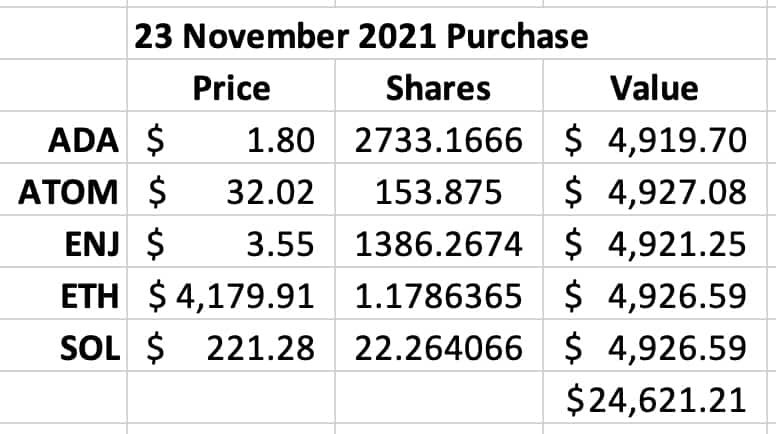
Astute readers will be asking, “If you bought $5000 chunks of each coin, then why did you have only about $4925 in each after the purchase.” I’ll tell you why: because transaction fees in the crypto world are outrageous. I used Coinbase as my “wallet” and trading platform, and they took a huge bite out of every transaction. This itself ought to be a red flag. (Or, at least, a yellow flag.)
After moving this money into crypto, I began to feel uneasy. This was in part due to the declining crypto market. You’re always going to feel uneasy when you’re losing money, right? But a bigger problem was that I knew I’d done something foolish.
One of my cardinal rules of investing (for myself) is to not invest in something that I don’t understand. I learned this rule from the writings of billionaire Warren Buffett (one of my personal financial heroes), who applies this to his own investment decisions. Buffett has famously missed the boat on some big companies — Google and Amazon, for instance — because he didn’t understand how their businesses worked, so he didn’t invest. He’s okay with that. He’d rather miss some winners than get sucked into losers. I like that philosophy, and I usually use it to guide my decisions. Usually.
This time, however, I watched as my cryptocurrency declined in value.
I was torn. Part of me wanted to sell, to get out from under the mental weight of this “investment”. But another part of me hated the idea. “I bought high,” I told myself. “I shouldn’t sell low.”
By January, my $25,000 in cryptocurrency had declined in value to somewhere around $15,000. I didn’t want to sell at a $10,000 loss. So, I doubled down on dumb. On January 24th — after a big dip in the crypto market — I put another $5000 each into these same five coins. (I rationalized this as dollar-cost averaging.)
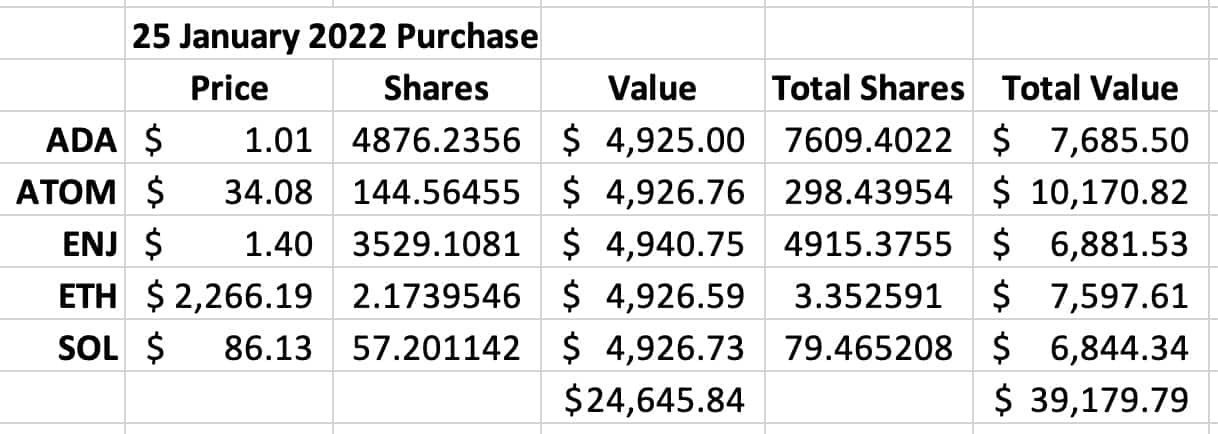
That’s right: Over the course of two months, I “invested” $50,000 into something I didn’t understand and didn’t believe in, something that I fundamentally viewed as a pyramid scheme. There’s no need to tell me how stupid I am. I already know.
An Escape Hatch
February and March were excruciating. Crypto prices remained mostly flat, but with a general downward trend. I was worried that a big crash would come and wipe out all of my money. Then, about the time my cousin Duane’s health began to worsen at the end of March, prices climbed for a week or two. I saw an opportunity. I sold everything.
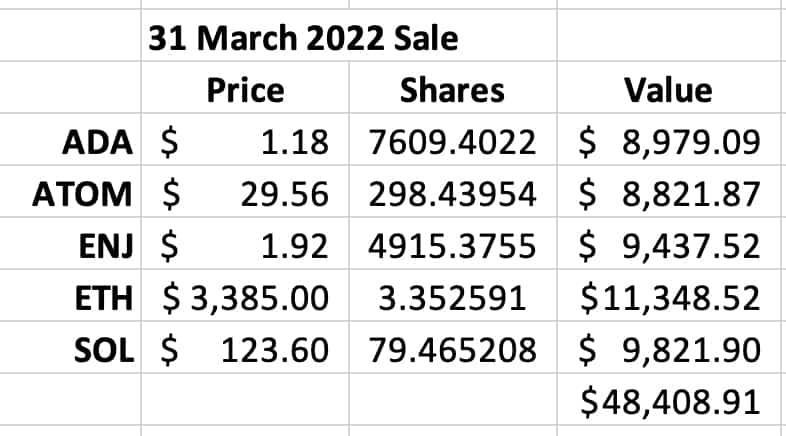
In the end, I moved $47,750.49 back into my checking account on March 31st. That’s not the $50,000 I started with, but close enough. (And note again how I sold $48,409.91 but only netted $47,750,49. Once again, I lost a ton to transaction fees. This feels like a scam within a scam.)
I believe that my crypto story is typical of most (although perhaps with larger amounts of money). I wasn’t investing. I was speculating. I saw people I know making tens of thousands of dollars on this new technology, and I wanted in on the action. So, despite not understanding how this all worked, I put money into the crypto market. I was gambling.
In retrospect, I got lucky. Yes, I lost $2249.51 in four months, but that’s far less than I might have lost.
What if I had been so caught up with caring for Duane that I paid no attention to my cryptocurrency? What if instead of selling at the end of March, I sold today? Great question. Let’s look at what my portfolio value would be as of this very moment (about 08:00 on 17 May 2022):
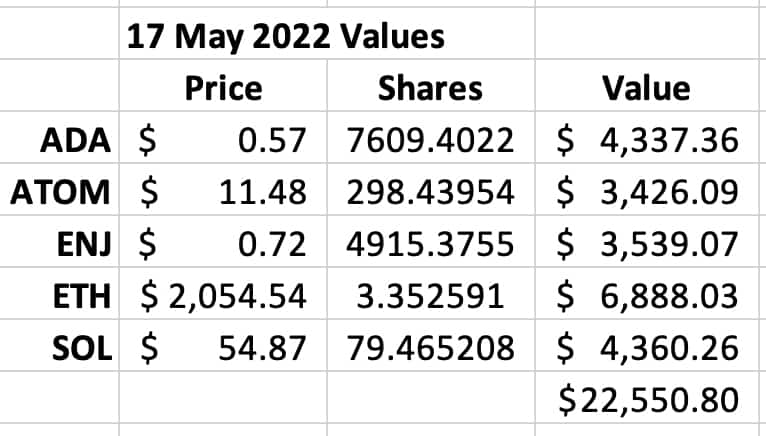
If I had not sold, the value of my coins would be less than half what they were six weeks ago.
And look at this! Here’s what the value of my crypto portfolio would be today if I hadn’t made the January purchase and the March sale. Here’s what my original $25,000 “investment” would be worth if I’d simply bought and held.
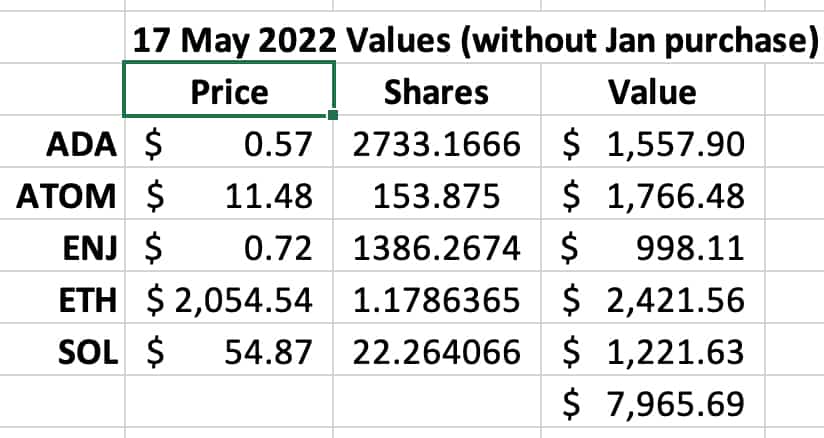
That’s a 68% drop. Holy cats!
Investing in What I Know
Now, I understand completely that I’m not taking a long view here. I’m “day trading”, as it were. This is something I would advise against in the stock market, and I’m sure there are people who advise against it in the world of crypto. For these folks, this is a long game. And maybe they’re right. Maybe prices will soar again. In fact, they probably will at some point. But the more I learn about cryptocurrency, the less I understand, and the more I’m grateful I got out when I did.
If this is the wave of the future, great. I’m glad some folks will make a lot of money on it. I’m not going to be one of those folks. After an ill-advised mis-adventure, I’ve returned to investing in what I know. On April 27th, I moved most of my remaining cash from the house sale ($154,130.55) into a total market index fund (which, coincidentally, has also lost value haha).

But here’s the thing. Paper losses in the stock market don’t bother me. I understand how the stock market works. I recognize that the stock market allows me to purchase tiny pieces of big businesses, businesses with actual storefronts and factories and datacenters, businesses with customers and sales and revenues. I have confidence that owning a broad-based index fund will allow me to share the long-term growth (and short-term losses) of the world’s business community as a whole. This makes sense to me.
But crypto? I still don’t understand it. And the more I learn about it, the more it seems like a massive pyramid scheme. After a brief foray into the world of crypto, I’ve decided to give it a pass. I’ll sit this one out.
But wait! What if I’d purchased Bitcoin 10+ years ago when I first heard about it? What if I’d, say, purchased 100 “coins” at $8 each, made an $800 investment? Well, this morning Bitcoin is trading at about $30,000 per coin. If I had 100 coins, they’d be worth $3,000,000. That’s a lot of money!
But this what-if scenario assumes that I would have held those hundred coins from the time I first heard about them until today. The odds of that having happened are almost zero. If I had purchased 100 coins at $8 each, I would have sold them long, long ago. I would have sold them before they reached $800. Or $80. I probably would have sold them once they reached $18.
Further Reading
You shouldn’t really take cryptocurrency advice from me because, as I’ve mentioned several times, I don’t understand how the hell it works or why it has value. It makes no sense to me. You should make your own decisions regarding crypto based on the advice of people smarter than I am.
One of those smart people is Nicholas Weaver, a senior staff researcher at the International Computer Science Institute and a a lecturer at the UC Berkeley computer science department. Here’s a long and interesting interview with Weaver from Current Affairs in which he says that all cryptocurrency should die in a fire. One quote:
So the stock market and the bond market are a positive-sum game. There are more winners than losers. Cryptocurrency starts with zero-sum. So it starts with a world where there can be no more winning than losing. We have systems like this. It’s called the horse track. It’s called the casino. Cryptocurrency investing is really provably gambling in an economic sense. And then there’s designs where those power bills have to get paid somewhere. So instead of zero-sum, it becomes deeply negative-sum.
Effectively, then, the economic analogies are gambling and a Ponzi scheme. Because the profits that are given to the early investors are literally taken from the later investors. This is why I call the space overall, a “self-assembled” Ponzi scheme. There’s been no intent to make a Ponzi scheme. But due to its nature, that is the only thing it can be.
And here is a recent episode of This American Life in which host Ira Glass explores the world of cryptocurrency and NFTs (non-fungible tokens).
Finally, from The New York Times (and therefor possibly behind a paywall for you) is the latecomer’s guide to crypto, which does its best to be an even-handed overview of the world of cryptocurrency.
If you know of articles or podcasts or YouTube videos that do a good job of explaining cryptocurrency, please leave them in the comments so that I can add them to this list. Here are a few of the pieces that GRS readers have recommended:
- The problem with NFTs from Line Goes Up channel on YouTube.
- Bitcoin for Beginners from the Afford Anything podcast.
- Web3 Is Going Just Great, a website that cynically catalogs news from the world of crypto. (And here’s a Harvard Business Review profile of Molly White, the woman who created this website.)
Let me know if there are more pieces I should add here…
It’s December 1972. I am three years old. My parents have to be away for the night. They drive me to stay with Dad’s brother and his family. It’s cold and it’s raining. We stand on a covered porch and knock. A big lady with a big smile opens the door to greet us.
“This is your Aunt Janice,” Mom tells me. “And this is your cousin Nicky.”
You are standing behind your mother. You are eight years old. This is the first time we meet. You’re not interested in a little kid like me, and I’m too timid to pay much attention to you.
Mom and Dad leave. Your mother reads to me: The Little Engine that Could, Curious George, Doctor Seuss. You sit nearby and listen. Before bed, I learn that you wear plastic pants like I do. You’re a big boy but you still wet the bed.
It’s a Sunday in autumn 1978. You are fourteen; I am nine. My family is visiting yours after church. You are curled up in a chair watching football on a black-and-white television. You have a magazine in your lap. I am watching you watching football. We don’t have a TV, and I don’t know anything about football.
“What are you doing?” I ask.
“I’m watching the Pittsburgh Steelers,” you say. “They’re my favorite team.” You show me the magazine — an entire magazine only about football. It lists the teams and the players and the schedules for the entire season. You show me how you take notes in the magazine, writing down the scores of each game, writing notes about your favorite players.
I tell you that I like comic books. When the game is over, you take me upstairs to show me your comics. You don’t have many, and none of them are about superheroes, but when you offer me a Richie Rich, I take it home with me.
This is our first real interaction not as cousins, but as friends.
We see each other often at family gatherings during our childhoods. We are friendly, but the five years between us is a very real barrier at this point. Soon, that barrier will fall.
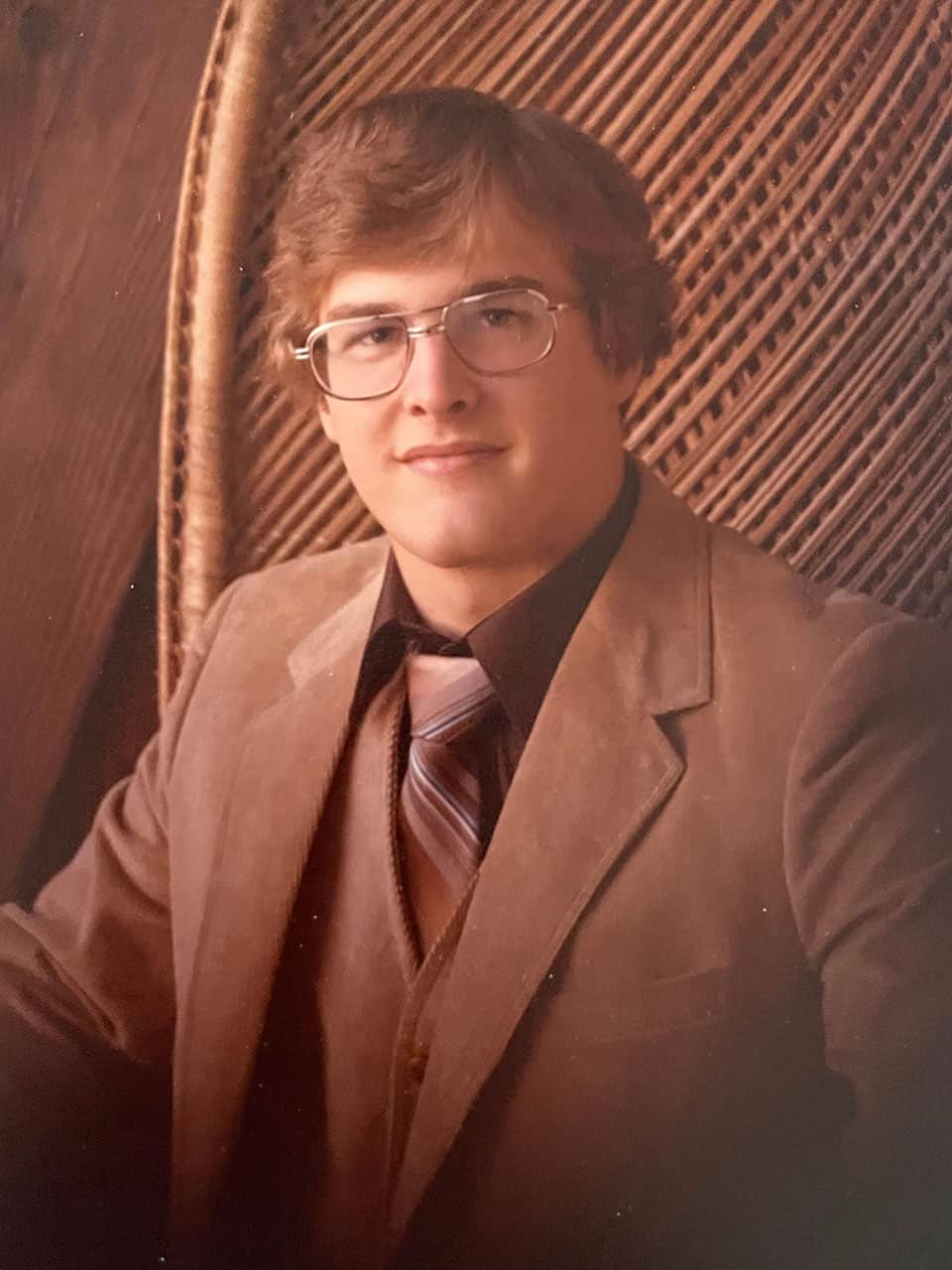
It’s sometime during 1983. I’m riding in the car with Dad. He hands me the newspaper and tells me to turn to a specific page. It’s an article about you. You are nineteen. You have been convicted of a crime, a crime that I don’t understand. Dad explains it. You’ve hurt somebody very badly.
We don’t see you at family gatherings for a couple of years.
It’s summer 1986. You’re living down the road at grandpa’s house. Since grandma died, he’s been struggling and it’s helpful to have somebody living with him. You have the entire upstairs to yourself. At first, I’m nervous about visiting you. You are a criminal. I cannot let that go from my mind. Eventually, however, I let my guard down. I allow myself to move on.
You’ve begun working for Dad as the box factory’s first employee. When I help in the shop after school, you and I chat. We talk about music. We talk about books. (After you read Zen and the Art of Motorcycle Maintenance, we talk a lot about Quality.) We talk about movies, especially your favorites like Being There and After Hours.
Now and then, I walk down the road to visit you. We sit upstairs and you play your records for me. You play Yes and Deep Purple and Queen. (You play me a lot of Queen.) You play Styx for me: The Grand Illusion. To you, it’s an okay album. To me, it’s a revelation. It becomes part of the soundtrack to my life.
It’s September 1991. I’ve graduated from college without a plan. I take a job selling insurance door to door. The job requires I live near Portland, so I move in with you. You’re renting a duplex in Canby.
Your home is a mess. It’s chaos. It’s a disaster area. There are dishes piled high in the sink. There are clothes piled high on the floor. There’s Stuff everywhere. But you have a spare bedroom for me, so I live there.
You work at the box factory. I sell insurance. In the evening, we chat and play games while watching MTV. Nirvana’s “Smells Like Teen Spirit” is in heavy rotation. We don’t know what to think of it.
I buy a Super Nintendo. I buy a Game Boy. I buy a Geo Storm. “You’re spending a lot of money,” you tell me. “It’s money you don’t have yet.” You warn me about going into debt, but I don’t listen.
It’s spring 1993. You’ve been watching me struggle with money. You lend me a copy of The Only Investment Guide You’ll Ever Need by Andrew Tobias. You show me how to use Quicken to track my money. You teach me about mutual funds.
I begin investing $150 each month in Invesco mutual funds. You are pleased. So am I. But this adventure ends when I decide that I’d rather have a new computer. I cash out my shares to buy a new Macintosh. You are disappointed in me.
It’s autumn 1994. You’ve purchased a house in Molalla. But because you’re a cheap bastard, it’s a cheap house. It’s 80 years old. Maybe more. It’s in rough condition. You don’t care. It’s yours.
On Sunday mornings, I drive out to watch football with you. I buy donuts and chocolate milk, which we consume in great quantities. We watch the Pittsburgh Steelers. In the afternoons, we watch the Seattle Seahawks. Some days we play computer games instead. We play Warlords and Warlords II. We play Darklands. We play Civilization.
We have become close friends.
We attend concerts together. We eat dinner together. We talk about music and movies and games and books. You are one of the only people in my life who is willing to engage in deep, philosophical conversations and I appreciate that.
It’s July 1995. Dad is dying. The cancer is dragging him under. He’s decided to leave 60% of the box factory to Mom, 10% to me, 10% to Jeff, and 10% to Tony. He’s also leaving 10% to you, his nephew. More importantly, he’s leaving you in charge of the business.
Since your father died five years ago, my father has stepped into that role for you. He truly sees you as a son.
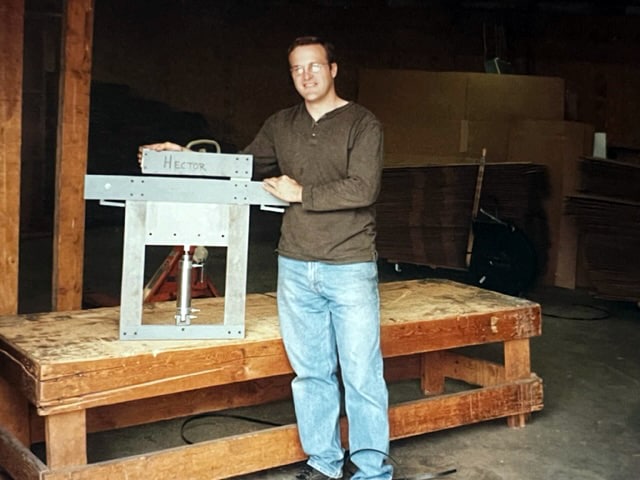
During the final weeks of Dad’s life, you begin leading the business. You’re also active in helping him put his personal affairs in order. The day he dies, you’re the one who is responsible for getting his will notarized. You personally dig Dad’s grave at the church cemetery. It’s a monumental task but you see it as a debt you owe him.
(Twenty-seven years later, I deliberately seek to pay you the same respect. During the last two months of your life, I’m with you as much as possible. “I want to be your hands and feet,” I tell you, and I mean it.)
It’s summer 1996. You have embraced your homosexuality. You are living the Gay Life. You are partying and dating and going to the gym. You introduce me to some of your friends: Tom, David, Shad, Hector.
You sell your house and rent an apartment in Portland. You begin to travel. You’re interested in European history, so you tour Greece and Italy with Hector. You make another trip to see Italy with your friend Kathy. You tell me that I ought to travel too. I’m not interested in travel.
You’ve been a life-long stamp collector, but now your focus turns to ancient coins. Ancient coins give you a chance to combine two passions: collecting and history.
It’s summer 1999. One afternoon I come back from making sales calls and have a bunch of trading cards in my hand. “What are those?” you ask.
“They’re Magic cards,” I say. I explain that Magic: The Gathering is a game played with collectible cards. Each card bends the rules in some tiny way. Your aim is to use your pool of cards to build a deck that can defeat the deck your opponent builds. “I guess it’s a little like the card game War,” I say.
I teach you to play. Within a few months, you know more about the game than I do. Much more. You become obsessed with it. You buy boxes of cards. You play in tournaments. You’re not especially good, but you enjoy it. And you have moments of brilliance. In fact, at one tournament you actually defeat the number one player in the world. Mostly, though, your play is fair to middling.
During the next 20+ years, you build a vast collection of Magic cards. You have thousands of cards. Tens of thousands of cards. Hundreds of thousands of cards.
You also dive deep into ancient coins. You order bags of “uncleaned coins” from internet dealers, then meticulously soak and scrub them. When they’re clean, you get the joy of trying to determine which coins you’ve acquired. You buy books on coins. You read about coins. You try to share your passion with your family and friends, but nobody else is interested.
It’s July 2007. I’ve just returned from my first trip to Europe: two weeks in the U.K. with my wife and her family. I’m back at the box factory but struggling. I don’t want to be there. I want to be anywhere but the box factory.
You are angry. You are bawling me out. “You never should have gone on that trip,” you spit. “Your absence made it abundantly clear just how little work you do around here.”
You’re not wrong. For a while, I’ve done almost nothing at the box factory. My attention has been focused on this blog, on Get Rich Slowly. In fact, I’m now earning as much from the blog as I am from the box factory.
“You’re right,” I say. “So why don’t I quit?” It takes a few months for me to get the guts, but I do it. I leave the box factory to become a full-time writer.
It’s November 2008. You and I spend an afternoon cleaning the moss from Mom’s roof. While doing so, we have another one of our deep conversations. This one is about money. It’s about wants and needs. I turn this conversation into a blog post, and the ideas we discuss become a key part of my financial philosophy.
It’s September 2012. You and I take a three-week tour of Turkey. We make it up as we go along. It’s the first time we’ve traveled together, and we’re pleased to discover that we’re perfect travel companions. There’s an easy flow to our journeys.
We enjoy strolling through Istanbul together, we enjoy taking the bus to Pamukkale, we enjoy the early morning hot-air balloon ride over Cappadocia. But we’re also willing to give each other space. I spend one day at the hostel, writing and drinking beer. You spend a day exploring small villages in central Turkey. It’s a grand adventure that we both enjoy.
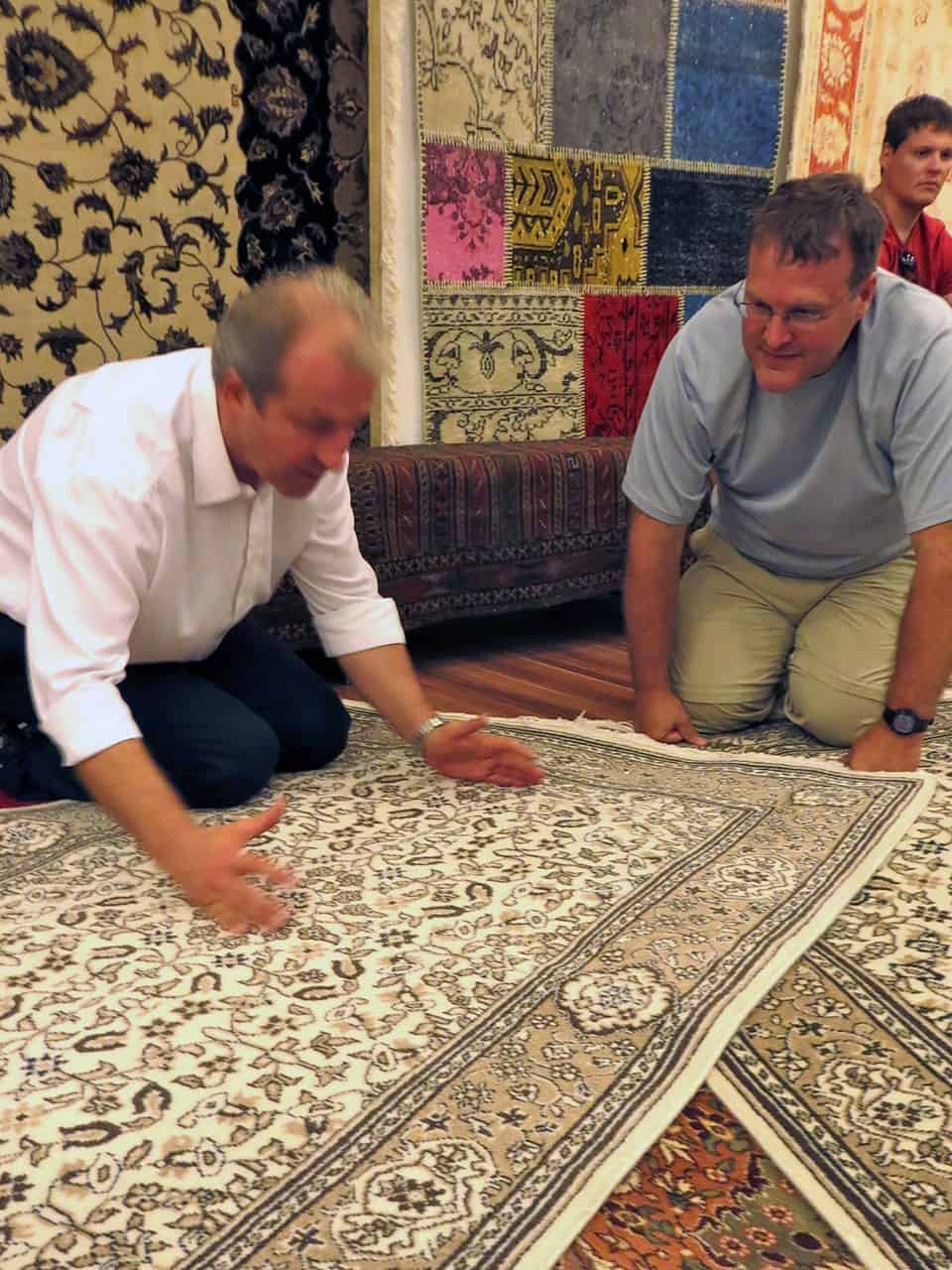
When we return from Turkey, we agree that we should travel together in Europe on a regular basis. But life gets in the way.
It’s Spring 2017. It’s been five years since our trip to Turkey. We’re ready travel together once more. After a year of talking and planning, you and I and Kim have plotted a month-long driving tour of Spain. Mostly, we’re going to make it up as we go along — just as we did before. We spend a Saturday evening finalizing details over a bottle of red wine. “I’ll start booking places next week,” I say.
But on Monday, you phone me. “J.D, don’t start booking yet,” you say. “This is the thing. I have cancer. I’ve been getting some tests and the results just came back. I have esophageal cancer, and I need to start treatment immediately. I can’t do the trip.”
My heart sinks — not for me, but for you. It’s the family curse. Grandma died of cancer. Your father died of cancer. My father died of cancer. Your brother died of cancer. All of us Roth males live in fear. We’re waiting for the day we learn that the curse has struck. And now it has struck you.
It’s Summer 2018. The doctors have been treating your cancer with immunotherapy. You and I grab the dog on a Wednesday morning and drive to the Oregon coast. You tell me all about your cancer, its survivability (bleak!), and the things you still want to do.
“I want to travel, J.D.,” you say. “You and I still have time to see the world.”
Your prognosis waxes and wanes. Some days it seems like you’ll live for years. Others, it seems like you have only weeks. Still, we manage to plan and execute a family trip to Europe in December. Your brother and three members of his family join us to explore Christmas markets in Austria, Hungary, Czech Republic, Switzerland, Germany, and France.
After your brother’s family returns home, you and I travel together for a week. Against your protests, I pay for us to ride the Glacier Express across the Swiss Alps. It’s too expensive for your frugal nature. But you love it. You are in awe. “J.D.,” you tell me later, “I’m so glad you made me do that. It was one of the highlights of my life.”

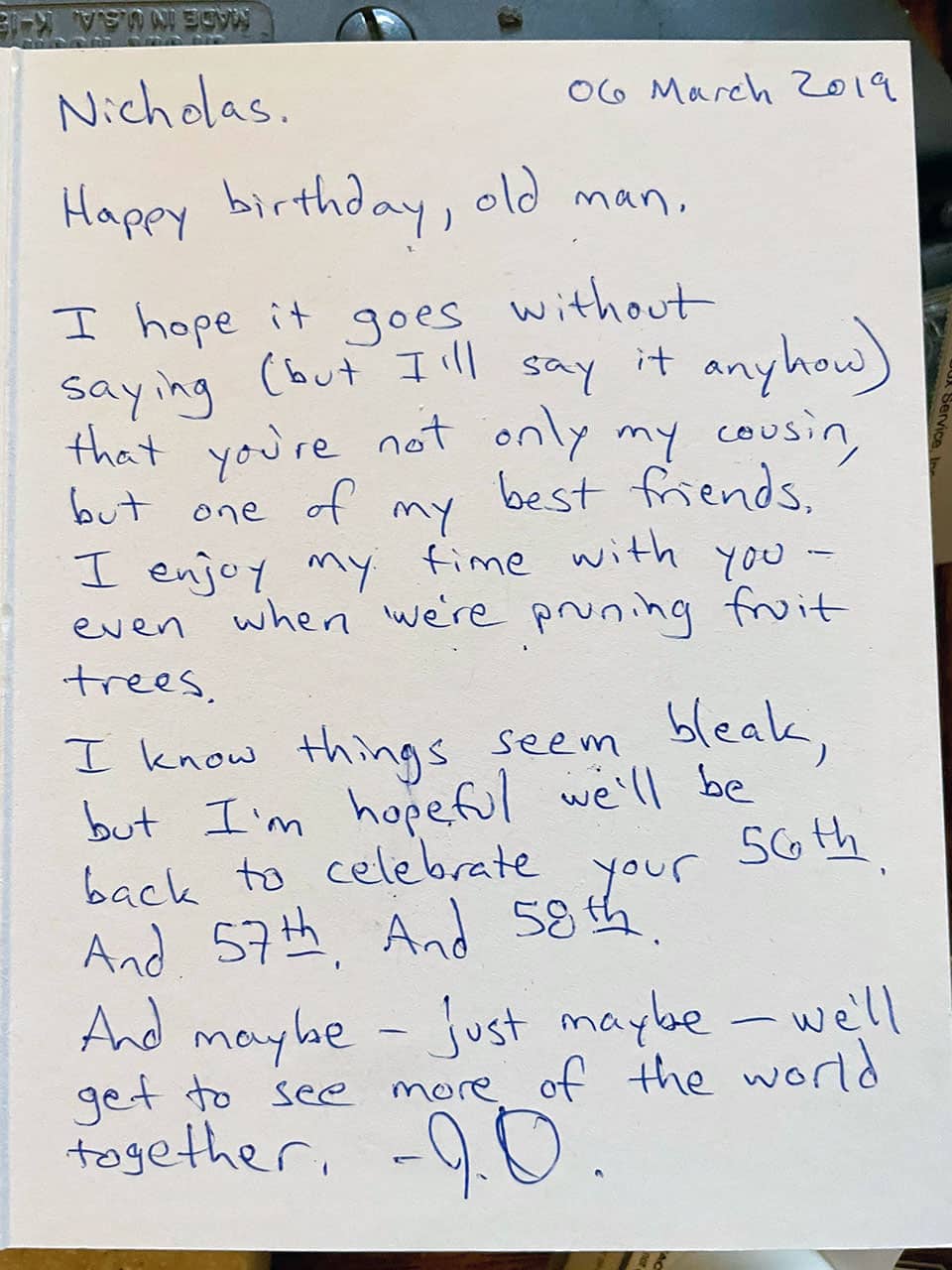
It’s May 2019. You and I are in the middle of a two-week tour of northwestern France. We’re making it up as we go along, as we like to do.
We spend a night on the island of Mont-Saint-Michel. You love it. We spend a night at Fontevraud Abbey, where we eat in the Michelin-star restaurant. You do not love the meal. The food is fancy but you are unimpressed. It’s too expensive. You cannot believe that I would spend money on this.
As we drive across France, our discussions are deep and weighty. You are weak and tired. Your mortality is heavy on your mind. Like me, you are filled with self-loathing — the crime you committed in your youth is always on your mind — so we talk at length about what makes a person good and what makes a person bad. Does one mistake define a life? How can you forgive yourself for the wrongs you’ve done to others? Neither of us has any solutions, but it helps to talk about these things with someone you trust.
It’s COVID times. You make yourself scarce. You are immunocompromised, so you’re unwilling to take risks. You are angry at your brother and his family because they don’t take COVID seriously. You vent your frustrations to me. You love Bob but this is causing a real rift in your relationship.
You continue your treatments — chemotherapy and others. Often, these treatments leave you drained and exhausted. You cannot even bring yourself to play Everquest. (You’ve been playing Everquest for nearly twenty years. You have a regular group that you play with. The game is a big part of your life.)
“Make some videos for me,” you say. You tell me this again and again. So, I make some videos for you.
I record myself playing Hearthstone. I record myself playing World of Warcraft. I record myself playing Civilization. When you don’t have the strength and focus to play games yourself, you watch me playing my games. I have no idea why you find this appealing, but you do. So, I continue to record videos for you.
It’s December 2021. You’ve grown much weaker. You are tired all of the time. It’s a struggle for you to walk. Still, you’re doing your best to live life as normal.
“I want to visit you and Kim in Corvallis,” you say. You drive down one Saturday and bring with you boxes of craft supplies. We spend hours building Christmas ornaments and decorations. In the evening, you introduce us to “The Great British Baking Show”.
The next Saturday, I drive up to Portland. You and I spend the day baking Christmas cookies. You’re weaker even than seven days ago, so you sit at the table and mix ingredients. I do all of the moving around.
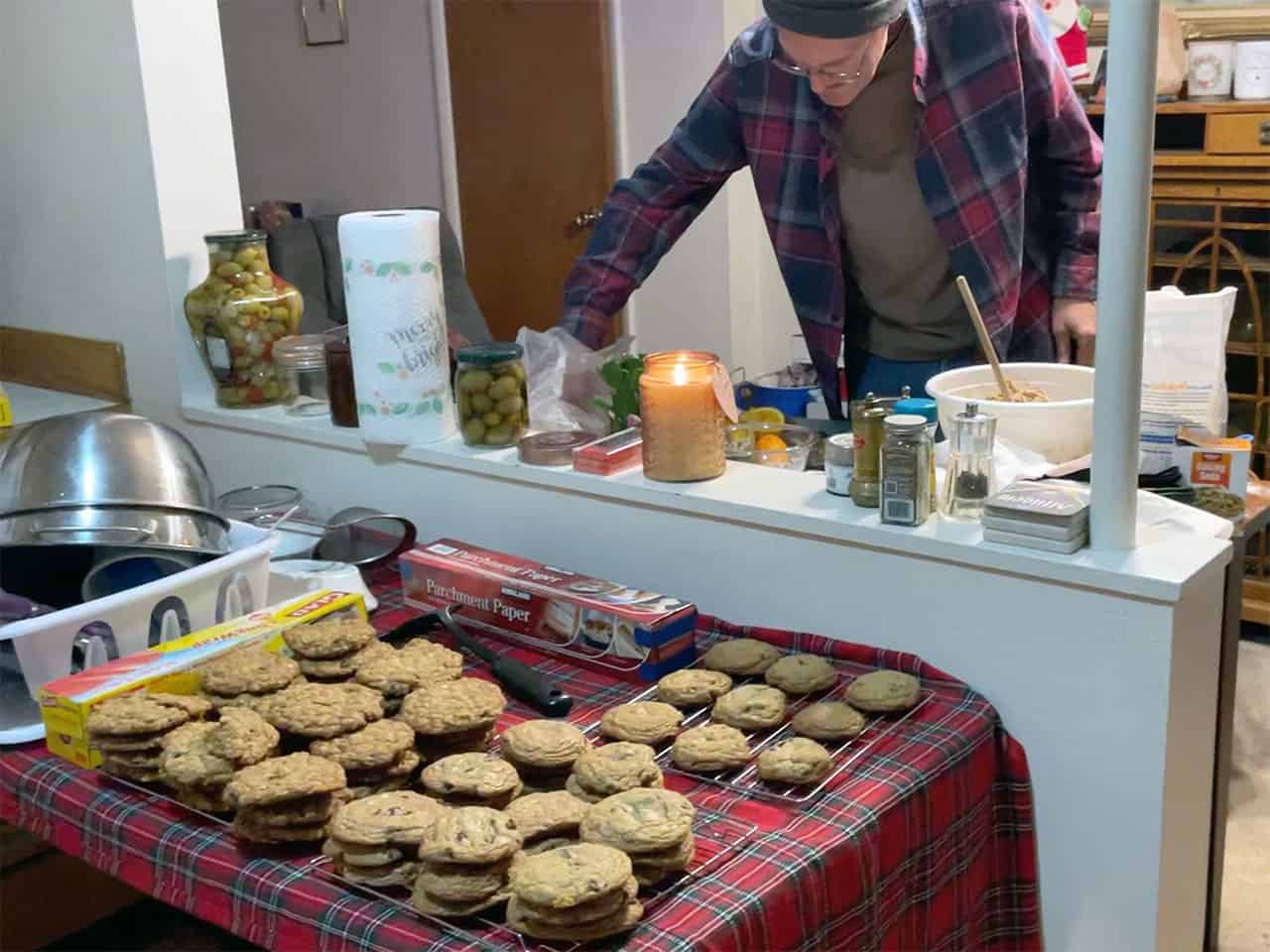
“I think I’m going to leave my coins and cards to you,” you say. I’m uncomfortable with the conversation.
“Whatever you’d like,” I say. Over the years, you and I have continued to play Magic: The Gathering. You frequently play online. I play only when you and I attend “pre-release” tournaments. Maybe once each year, we’ll spend a Friday night with other nerds, playing Magic in local game stores. You remain a better player than me, but my skills are improving. I rarely lose anymore, but I don’t win much either. I earn a lot of draws.
It’s 11 February 2022. We’re packing your apartment. You’ve decided to move to Canby so that you can be closer to your brother and closer to the box factory. You and I are sifting through 21 years of Stuff. We’re creating a pile to donate. We’re stuffing boxes with clothes and mementos. Mostly, we’re packing your collections.
You have boxes and boxes of Magic cards. You have boxes and boxes of ancient coins. You have travel souvenirs. You have old computer games and manuals. You have children’s books. You have crafting supplies. You have far too much food for a single guy — and most of that food is long expired.
As we pack, we reminisce. We talk about the things we’ve done together. We talk about the things we want to do — the things we wanted to do. You show me your new fish. You’ve always loved aquariums. During the 1990s, you and I both set up aquariums at the same time, but we lost interest after a few months. Now, at the end of your life, you’ve decided you want to keep fish again. You enjoy telling me all about them.
It’s 26 February 2022. I’ve returned to help you pack. It’s slow going because you have no stamina. You find it difficult to make decisions. You are having trouble breathing. “Hector says I should go to the E.R. when I have trouble breathing,” you say, “but that seems excessive.”
After two hours, though, you’ve changed your mind. You ask me to drive you to the hospital, so I do. The pneumonia you had in January has returned. And the doctors tell you that the reason you’re having so much trouble breathing is that your left lung has collapsed.
It’s 04 March 2022. I’m at your apartment to help you finish packing. You are scheduled to move the next morning. The phone rings. It’s one of your doctors. You put him on speaker so that I can listen. You are seated on the sofa, your head bowed. As the doctor talks, you rock back and forth. Back and forth. Back and forth.
The doctor tells you that a feeding tube is not an option. “I’m sorry,” he says. “We can’t take the risk. The procedure is likely to kill you.” The doctor is audibly uncomfortable, yet he spends twenty minutes talking you through what comes next.
“I know this hurts to hear,” he says, “but you only have a few months left. Maybe a few weeks. It’s hard to say.” In reality, your life will end in 53 days.
“At this point,” the doctor says, “you should make your life about you. You should eat what you want to eat. You should drink what you want to drink. You should go where you want to go. You should see the people you want to see.”
You rock back and forth. Back and forth. Back and forth. “Thank you,” you say. “I understand.” After the call has finished, you sit in silence for a few minutes. I watch from the kitchen.
“Well,” you say. “I guess we should finish packing.” So we do.
I spend the night at your apartment. This is the first of 29 nights I will spend with you during the final 53 days of your life. From here on out, either your brother or I — often both of us — will be with you nearly all of the time.
It’s 07 March 2022. Yesterday was your 58th birthday. Today, we are unpacking at your new apartment. In a strange twist of fate, it’s the other half of the duplex you and I rented together in 1991.
You’ve set up three aquariums in the apartment, including one devoted only to Mbuna cichlids from Lake Malawi. That tank is currently home to six 34-cent goldfish, but you and I will gradually purchase nineteen cichlids over the next few weeks.
Your brother and his wife come over to help us unpack the kitchen. You sit in your walker and sort the boxes. You hand food to us. Audrey handles the food you’re keeping, tucking it into cupboards. Bob boxes some food to take home. I box the rest for me and Kim.
After Bob and Audrey leave, you begin experiencing severe chest pains. I drive you to the emergency room. You and I spend the night in the E.R. while doctors perform a variety of tests. I show you the videos I’ve made of our trips to Turkey and France.
These videos take your mind off your situation. I promise that I’ll finish the video of our family trip to European Christmas markets, but I never get the chance to do so. You’re discharged at five and we head home.
It’s 13 March 2022. You and I drive around Portland to look at fish. Your aim is to have 25 cichlids in your 90-gallon tank, but we start with six.
In the afternoon, Bob and Hector come over. The three of us have planned an important conversation with you, and you can smell it from a mile away. “You’re taking away my keys, aren’t you?” you say. Yes, we are taking away your keys. Driving has become dangerous for you. But that’s not all.
Hector asks if you’ve considered hospice. You become defensive. You don’t want to do hospice because you’re afraid that means surrendering to the disease. You don’t want to surrender. You want to fight. You want to continue driving to the E.R. whenever you have a problem.
Bob and Hector and I know this isn’t a workable solution. We try to talk some sense into you. You are resistant. You and Hector bicker like an old married couple. In the end, though, you agree to meet with hospice to learn more about it. By the time I see you next, you have enrolled in a hospice program. It makes everything so much easier.
Over the next six weeks, we all come to appreciate the hospice nurses and volunteers. They’re amazing.
Also over the next six weeks, you have us watch hundreds of hours of the Aquarium Co-Op channel on YouTube. The channel plays almost constantly on the living room TV. Eventually, you have me drive you to purchase a new $300 TV so that you can hear and see the Aquarium Co-Op videos better.
At first, I’m annoyed by the constant fish videos. In time, however, I grow to love them. They’re comforting. And the host (Cory) is precisely the kind of YouTube personality I’d like to be — only he talks about fish and I’d like to talk about health and wealth. Bob and Hector and I may be the folks providing the bulk of your in-person care, but you demand Cory as a constant presence too.
It’s 17 March 2022. We’re driving to Portland so that you can visit your friend Kathy — and so that you can buy more fish. We’re talking about all of the loose ends in your life. I ask why it took you so long to complete your will. I ask why you haven’t designated beneficiaries on your investment accounts. I ask why you haven’t made a list of your logins and passwords.
“I’m in denial, J.D.” you say. I tell you that I get it.
The conversation turns to your new apartment and all of the boxes left to unpack. “It would really help if you took some of this stuff down to Corvallis,” you tell me. “I keep saying it’s okay to take some of the boxes of coins and Magic cards now before I die,” you say. “Why don’t you do it?”
I shrug. “I don’t know,” I say. “I guess I’m in denial too.”
You grab my right arm, causing me to veer slightly as I steer. “Thank you, J.D.,” you say. “Thank you. I get it too.”
It’s 22 March 2022. I’ve been away for three days taking care of Real Life in Corvallis. I’ve just returned to Canby. You are surly and sour. You are in pain. You are uncomfortable. You are finding it difficult to breathe. You are taking your frustrations out on everyone around you, even those that you love. Especially those that you love.
I can see that Bob is frustrated. “How do you feel about buying some new fish?” I suggest.
“I feel great about buying some new fish,” you say. I drive you around Portland for four hours. You’re too weak to exit the car, so I go into the pet stores and film their selection of cichlids. Then I return to the car so that you can see what each store has in stock. Eventually, we buy two fish.
We’re near Uwajimaya, the Asian grocery store, and you decide you want to try to go in. We get you out of the car, change oxygen canisters, then find a shopping cart for you to lean on. It takes fifteen minutes to walk from the snack aisle to the deli section. The journey exhausts you.
It’s precisely midnight between 23 March and 24 March 2022. You call from the other room: “Hello? Help!” I spring from the couch. Bob leaps from his recliner. We’re by your side in seconds.
“I can’t breathe,” you whisper. Your voice is plaintive, desperate. Bob wraps his arms around you and lifts you to a seated position. I pull the Pittsburgh Steelers blanket off you and then turn the oxygen dial to five, the highest it can go. You sit on the edge of the bed, gasping.
“I can’t breathe,” you say. Bob whispers to you, stroking your bony back. I go to the kitchen to see what drugs we have at our disposal. We gave you an ativan when you went to bed at ten. You’re supposed to go a minimum of four hours between doses but I don’t care. I get another one for you. I draw some morphine.
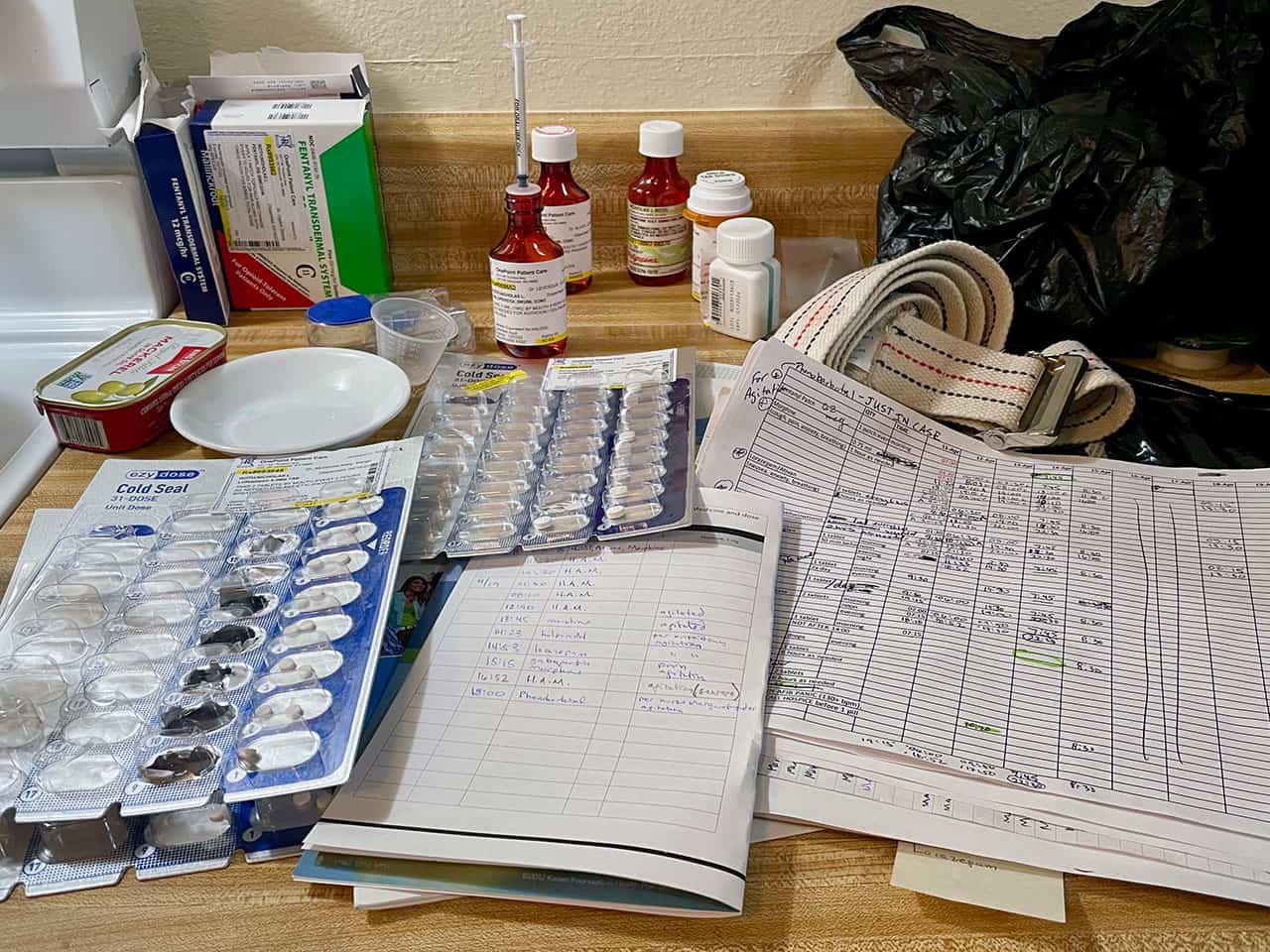
“I can’t breathe,” you say as you take the drugs. Bob calls the hospice nurse. It’s Tori, which gives me a sense of relief. Tori is awesome. She asks for your symptoms. She asks what drugs you’ve had during the past 24 hours.
“He’s on his fentanyl patch, of course,” I say. “He’s had two ativan in the past two hours. He’s had eight doses of morphine in the past day, but he hasn’t had any since six in the evening. He refused a dose at eight and again at ten.”
You don’t want to take the morphine. It makes you tired. It makes you muddle-headed. It makes you feel like you’re losing. In the afternoon, you blew up at a different hospice nurse. “I thought you guys were supposed to make me comfortable,” you barked. “Well, I’m not fucking comfortable.” When she suggested you take more morphine, you protested. “I watched when we gave my brother more morphine and he slipped away. The same thing happened with J.D.’s dad.”
“I can’t breathe,” you say, and Tori promises to call the doctor in charge of your case. The wait is agonizing. You can’t breathe. You can’t breathe. You can’t breathe. Tori calls back a few minutes later and tells us to increase the morphine.
“Give him another dose now,” she says. “In an hour, give him a double dose. Going forward, that’s the new dosage.”
Soon, you can breathe. The ativan relieves your anxiety. The morphine relaxes you. Bob lays you back on the bed and covers you with your Pittsburgh Steelers blanket. He and I sit in your bedroom, silent. We watch as you breathe. When you fall asleep, he returns to the recliner and I return to the sofa. We struggle to fall back asleep.
It’s 27 March 2022. You’re feeling stronger. Not strong, but stronger. You tell me that you’d like to go to the Coast, so we do.
You had harbored a hope of seeing Europe once more before you died. COVID dashed those hopes. You moderated your dreams, telling me that instead you’d like to make it to Atlanta to visit the Georgia Aquarium. That’s another dream that will never come true.
You decided that you’d be content if you could simply see the Oregon Coast Aquarium in Newport. Even that dream looked impossible for a few days. Now there’s a window of opportunity, so we seize it.
On the drive, we talk about music. I explain at length why I am such a fan of Taylor Swift and her music. “I hear what you’re saying,” you say, “but I just can’t get into her.” You’re a creature of habit. You like what you’ve always liked, and that mostly means classic rock.
As we drive, we take turns asking Siri to play songs on the car stereo. We steer clear of Taylor Swift and focus on the music you like. We listen to:
- Kansas – Dust in the Wind
- Mountain – Nantucket Sleighride
- Grand Funk Railroad – I’m Your Captain (Closer to Home)
- Neil Young – Old Man
- Trio – After the Gold Rush
- The Decemberists – Crane Wife
- Pearl Jam – Just Breathe
- James – Sound
- CSN – Southern Cross
- Jefferson Airplane – White Rabbit
- Deep Purple – Hush
When we reach the aquarium, you’re too exhausted to go in. I park in the sun so that you can be warm. You sleep in the car for an hour while I sit outside watching the Portland Timbers game on my phone. When you wake, you feel better. We get you in the wheelchair for the first time, and I push you around for 90 minutes so that we can look at the fishes.
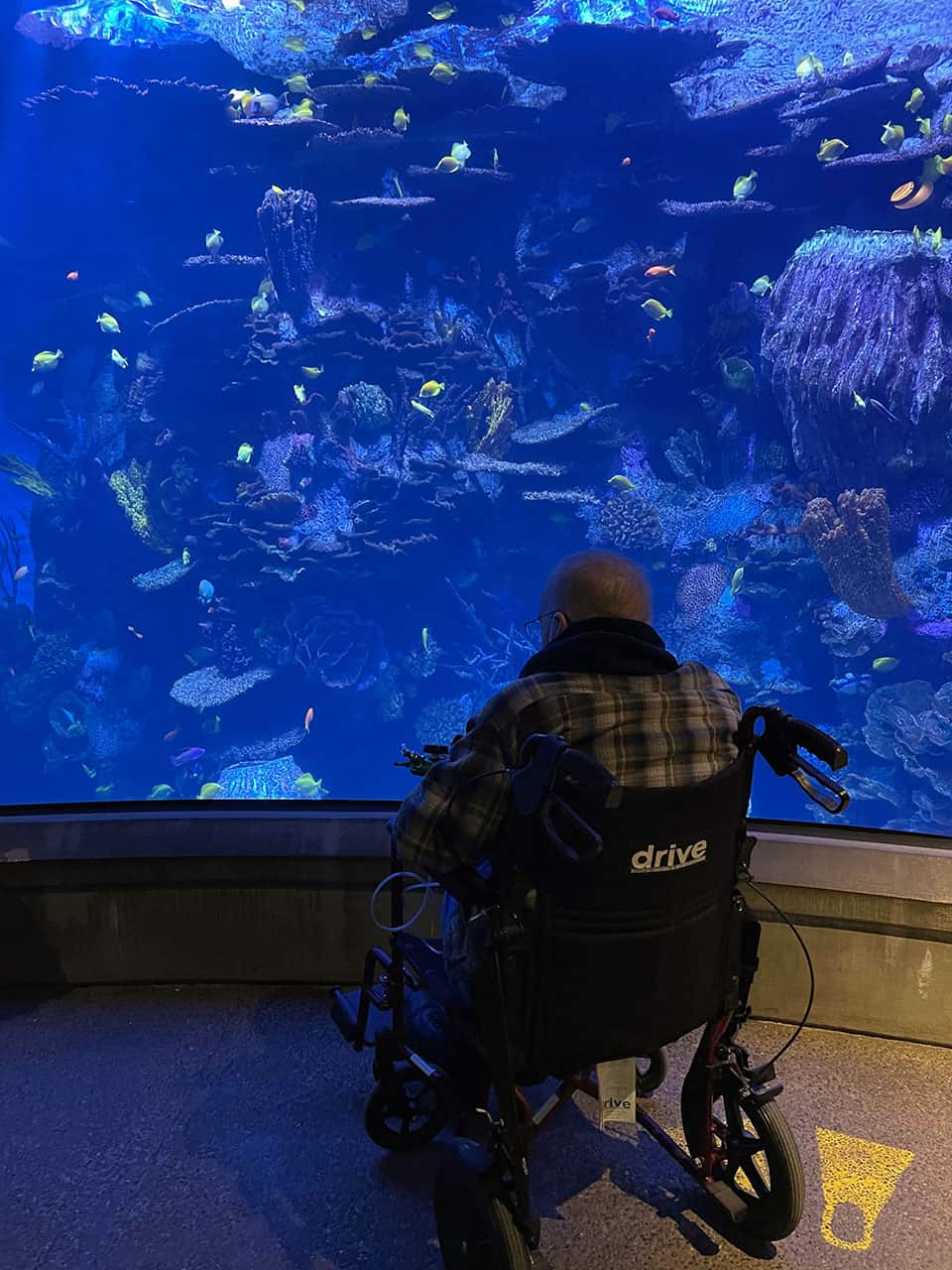
Afterward, you ask me to stop at the candy store. We spend $100 filling bags with salt-water taffy, almond roca, and chocolate-covered twinkies. I think it’s been a long day and that we should head home. You don’t want to go home. You want to see more of the coast.
I drive slowly along the shoreline. I drive through the touristy parts of town. I drive along the shoreline again. You’re not hungry, but you want to get fish and chips. We stop to look up the best fish and chips spot that’s open at 6 p.m. on a Sunday night. It’s located in a strip mall 45 minutes north.
The manager is friendly and accommodating. When you tell him you’re cold, he brings you a hot chocolate. You drink your cocoa with a bowl of clam chowder. I have one beer with some fish and chips. I give you one piece of fish. You think the food is delicious. As I’m wheeling you out the door, you make me stop and call over the manager. You tell him it’s the best fish and chips you’ve ever had.
On the drive home, you sleep. When we reach the apartment, you’re too weak to climb into bed on your own. I have to lift you. As I turn out the light, you whisper, “Thank you, J.D. Thank you for everything.” I sit on the couch and cry.
It’s early morning 29 March 2022. The past 24 hours have been rough. You cannot walk without assistance. Your cannot find the words you want. You cannot get enough air. You go to sleep early.
Then, for no apparent reason, you wake at 2:30 and you are almost completely your old self again. You walk to the kitchen and rummage through the fridge. You pour a glass of chocolate milk. You ask to watch a movie.
I choose Arrival. “It’s a beautiful film,” I tell you, forgetting that the beginning also features a death like the one you’re experiencing. As we watch, I try to explain some things because I know this is the only time you’ll ever see the film. (And, in fact, it may be the last film you ever watch.)
“This story is about memory,” I tell you. “And time. And how the two are interwoven. It’s sort of non-linear at times.” When the aliens appear and begin communicating with their circular “sentences”, I tell you this is the central metaphor of the film.
You are awake and engaged for the entire movie. You find it fascinating. You ask questions. I give you answers. When the movie is over, you want a bowl of ice cream. You get up unassisted, pull the vanilla ice cream from the freezer, then add some strawberry syrup to several scoops of the stuff. You wolf it down.
“What should we watch next?” you ask.
“Dude,” I groan. “I need some sleep. I need to drive home in a couple of hours.” So, we go back to sleep. But as I drift off, I’m filled with regret. What am I doing? Why am I sacrificing this precious time with you? Sure, I’m tired, but so what? All your life, you’ve said, “You can sleep when you’re dead.” Well, you soon will be dead — I can sleep then.
I look over to see if you’re awake, but you’re not. You’ve nodded off in your recliner. I’ll simply have to savor the three hours I just got to spend with the normal you. (This moment and this film also inspire me to start documenting these moments with you, and those moments become this blog post.)
It’s 31 March 2022. After 48 hours in Corvallis to rest and recuperate, I drive back to your apartment to relieve your brother. I’m hopeful that you’ll be just as awake and alert as you were two days ago. You’re not. In fact, things are grim.
You barely respond when I greet you. When I ask you questions, you gaze at me vacantly. When you do respond, it’s a guttural whisper or nonsensical steam of consciousness.
“What about the cigarette butt?” you ask as I clean the coffee table.
“What?” I say, looking around. “What cigarette butt?” Nobody in your life smokes.
“What about the cigarette butt?” you say, pointing to the coffee table. “The white one. What about it?”
Nothing you say over the next hour makes any sense. “Look at her eyes. She looks like a bug. Is the new girl in my medicine? The fish, the fish, the fish.” You have trouble completing thoughts. But even when you complete your thoughts, what you say is a sort of word salad. Sometimes I can puzzle out what you mean to say. Mostly, I can’t.
You become restless. You remove your oxygen tube and attempt to stand. I give you support. I walk you to the kitchen. You open the refrigerator. “Hold on,” I say. “I’ll get you a chair to sit in.” I let go of you for only a moment — for only enough time as it takes to lean over and grab a chair from the table — but in that moment, you collapse to the ground. I manage to slide partway under you in an attempt to break your fall.
“Wow,” you say. Yes, wow. Fortunately, neither of us is hurt. It takes several minutes, but you manage to crawl to your hands and knees, and from there I’m able to lift you to standing. This time, I don’t let go. We get you into the chair. You eat some seafood salad and some smoked salmon, then I help you stumble back to your recliner.
“I’m not qualified to do this,” I text Kim. “I don’t know what I’m doing.”
You wake in the middle of the night to make lists. You make lists of things to do. You make lists of things to give away. You make lists of people to call. Because you’re a cheap bastard, you write your lists on the back of old envelopes or grocery bags.
You pick up a pillow from the floor and hold it to your ear. Then you hold it to your other ear.
“What are you doing?” I ask.
“Why is this so loud?” you ask. “Is it a bomb?”
It’s 03 April 2022. Nurse Diane shows you how to use adult diapers (or “briefs”, as she calls them). I expect you to be defeated by this. You aren’t. You’re surprisingly pragmatic about their use.
It’s 08 April 2022. I arrive back at your apartment after several days in Corvallis. You’re in much better shape than when I left you. You’re cheerful. You’re lucid. You’re engaged.
You ask to the go the tulip fields, so I pack your wheelchair and meds and oxygen tank, then we load into the car. There’s a large crowd at the flower farm despite being a cool Friday afternoon. Although you grew up maybe two miles from the tulip fields, you’ve never been here before.
I push you around from row to row. You admire the color. You point out your favorites. I point out mine. In the catalog, you note the bulbs I should plant for next spring. We suffer through a chilly rain shower, caught unprepared in the open. Then we admire the rainbow that follows. We can see both ends, but no pots of gold.
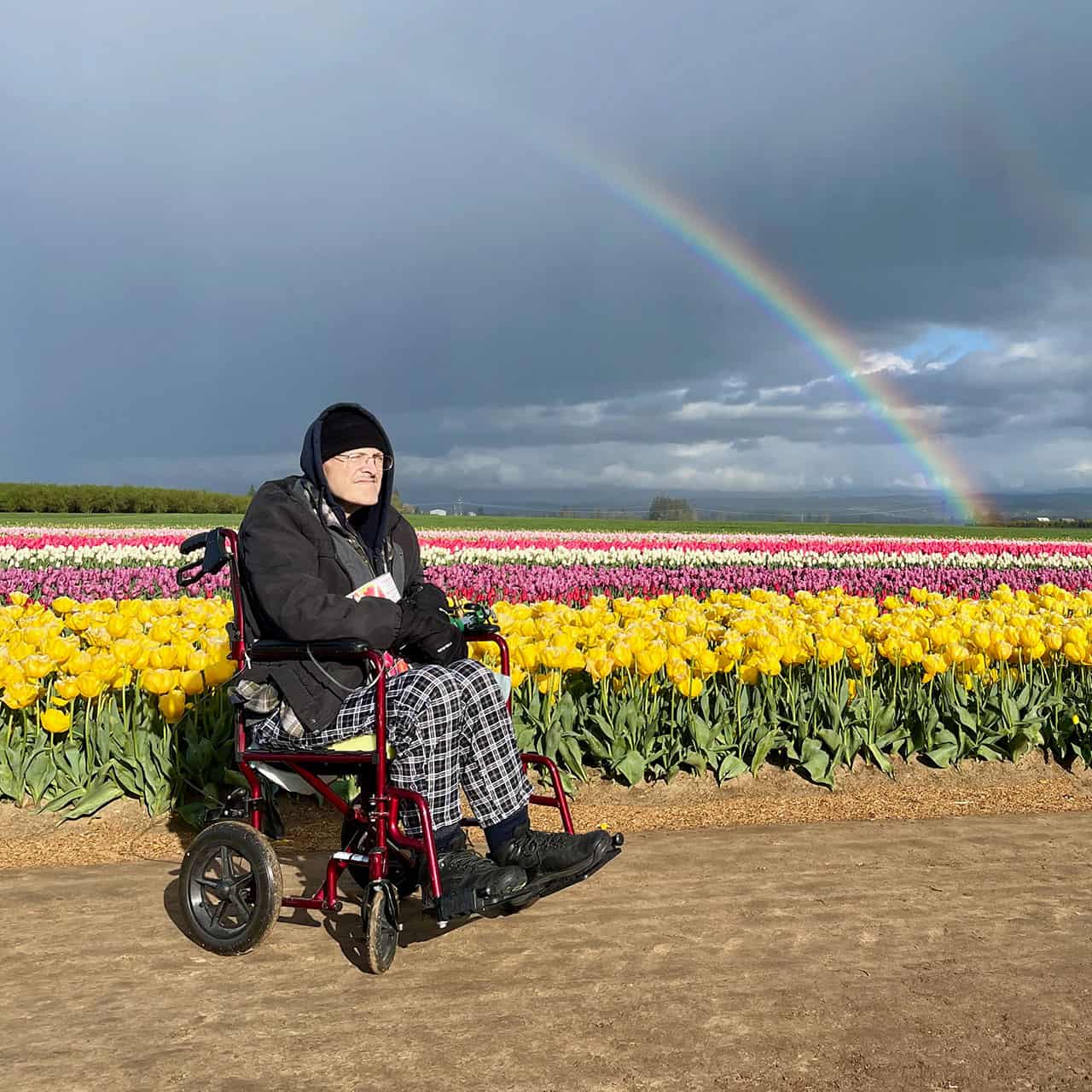
You’re hungry, so we drive to El Chilito, your favorite taco stand. It takes you twenty minutes to decide what to order: tacos dorados. When we take them home, you manage to eat one taco, but the rest of the tacos (and all of the chips) go to waste over the next several days. You have no appetite.
It’s 09 April 2022. After the hospice nurse visits, I tell you I’m going to go grab groceries real quick. Despite not having an appetite, you still dream of food. You are constantly having me add things to the shopping list: seafood salad, Greek yogurt, shrimp, apple juice, pretzels, black grapes (crisp, plump, juicy, and delicious).
I tell you I’ll be gone maybe thirty minutes, but you ask me to hold up. You want to go shopping with me. First, though, can I bring you the coupons from the mailbox? I do. It takes you thirty minutes to look through the flyers. There’s nothing that you want.
Then you decide you want to send flowers to your friend Kathy, who is also having medical problems. To do that, you need to know if she’s home, so you want to call Tom to learn Kathy’s status. You dial Johnny, your Everquest buddy, by mistake. You ask me if I can do something to make your phone less confusing. I try but it’s not the kind of phone I use, so I can’t understand the settings.
Three hours later — after several such digressions — we pack up and head to the grocery store. There, you’re immediately distracted by the Easter candy. You want malted milk chocolate eggs. We find them. Then it takes more than an hour to work through your short list of groceries. You’re fussy. You want to chat with the workers and customers. When the developmentally disabled fellow offers us help, you tell him you like his accent. He doesn’t have an accent. He has a speech impediment.
Later in the evening, you decide that it’s time to do a water change in the 90-gallon cichlid tank. Before we do the water change, you want to vacuum the gravel. You’re not happy with how I’m doing the job (it’s the first time I’ve ever done it), so you stand to do it yourself.
“You shouldn’t be standing,” I say. “And you should be wearing your oxygen tube.”
“If you’d do this right, I wouldn’t have to stand,” you tell me. I fume inside, but let it pass. This, I remind myself, is why I aborted my return to the family box factory: I couldn’t abide your need for perfection from everyone (except yourself). My anger passes quickly.
You sit back in the wheelchair, then bend over to pick up a book. Immediately, you bolt upright.
“Something’s wrong,” you say. “I can’t breathe. I can’t breathe. I can’t breathe.” I scramble to get the oxygen re-attached. I dash to the kitchen for the morphine. I grab my phone.
“Call Hector,” you tell me. I call hospice instead. “Goddamn it, J.D., call Hector,” you say. I bring your phone to you so that you can call Hector while I speak with the hospice nurse.
Hector tries to calm you through breathing exercises. Hospice has me administer lorazepam and haloperidol. They’ll relieve your anxiety and help you breathe — but not for fifteen minutes. You’re panicking. “Where are you, Hector?” you ask. “Why aren’t you here?”
“I’m home in Vancouver,” he says.
“You guys are useless,” you say. “Where’s Bob?”
“Your brother is at the coast,” I tell you. “He’s a couple of hours a way.” Bob and Audrey have spent the day with friends. They’ve just finished eating fish and chips at the same place you and I visited a couple of weeks ago.
“I’m surrounded by fools,” you say. “I can’t breathe!”
The oximeter says that you can breathe. Your oxygen saturation is fine. Your pulse, on the other hand, is bizarre. It’s 40. Or 220. Or 40. The reading is inconsistent, but it’s always one of those two. I try to take your blood pressure with the automatic cuff. I get nine consecutive errors. Some of these are because you’re agitated and won’t sit still. But why am I getting the others?
At last, I get a reading: 60/44. I write the number on my hand. I call hospice again. “He’s in A-fib. You’ve exhausted all your tools at home,” the nurse tells me. “Call 911.”
I call 911. I’ve never called 911 before. They send an ambulance. I’ve never been involved with an ambulance or paramedics before. They pull off your shirt and attend to you. They ask me questions. They verify your POLST. They load you up and drive you to the hospital. I follow a few minutes behind.
As I drive, I call your brother. He’s in Salem, on his way back from the coast. He’ll meet us at the hospital.
At the hospital, I am surprised to learn that they’re releasing you almost immediately. Bob arrives, and we chat with the doctor in the emergency room. He tells us you had an attack of atrial fibrillation with rapid ventricular response — A-fib with RVR. The paramedics shocked you with cardioversion to “reset” your heart. You can go home now.
We’re surprised but pleased. You spend less than twenty minutes total in the emergency room. I drive you home. You ask to listen to Queen. Siri makes some odd song choices. First, The Show Must Go On: “Does anybody know what we are living for?” Then, You’re My Best Friend: “Oooh, you make me live.” Finally, Who Wants to Live Forever. I wince at the playlist, but you don’t say anything.
It’s 10 April 2022. The hospice nurse is here to follow up after last night’s excitement. You’ve been drugged and out of it for the past twelve hours. You ask me to take you to the toilet.
“J.D.,” you whisper as I help you to the commode. “I’m afraid. I don’t think I’ll make it past today.”
After the nurse has gone you fall back asleep. You sleep for 33 of the 36 hours following your visit to the emergency room. At one point, you wake with a coughing fit. I’m by your side with morphine. You dutifully take it.
“How long?” you ask.
“How long what?” I say.
“How long is there left to live?” you ask.
“I don’t know,” I say, stroking your back. The answer to your question is: fifteen days. You have fifteen days left to live. But truly? When it’s all over, we’ll be able to look back and say that your weekend trip to the E.R. was the true beginning of the end. From here on out, you’re not so much living as you are dying.
It’s 11 April 2022. Hospice nurse Mary arrives. She’s your primary nurse, but I’ve never met her. She’s even more amazing than Tori. Even more amazing than Helen. She can tell that the mood in the house is gloomy. Our morale is dismal. You are defeated. You are waiting around to die.
Mary is having none of it. “I’m not supposed to say this sort of thing,” she confides, “but you are the one in charge. You are the one calling the shots. Who cares what the doctors tell you? If you want to fight, fight.”
“I do want to fight,” you mutter.
“Then we’re here to help you,” your brother says.
Mary’s visit lasts less than an hour, but has a profound effect. The morale in the house has gone from low to high. We have a plan. We’re going to fight.
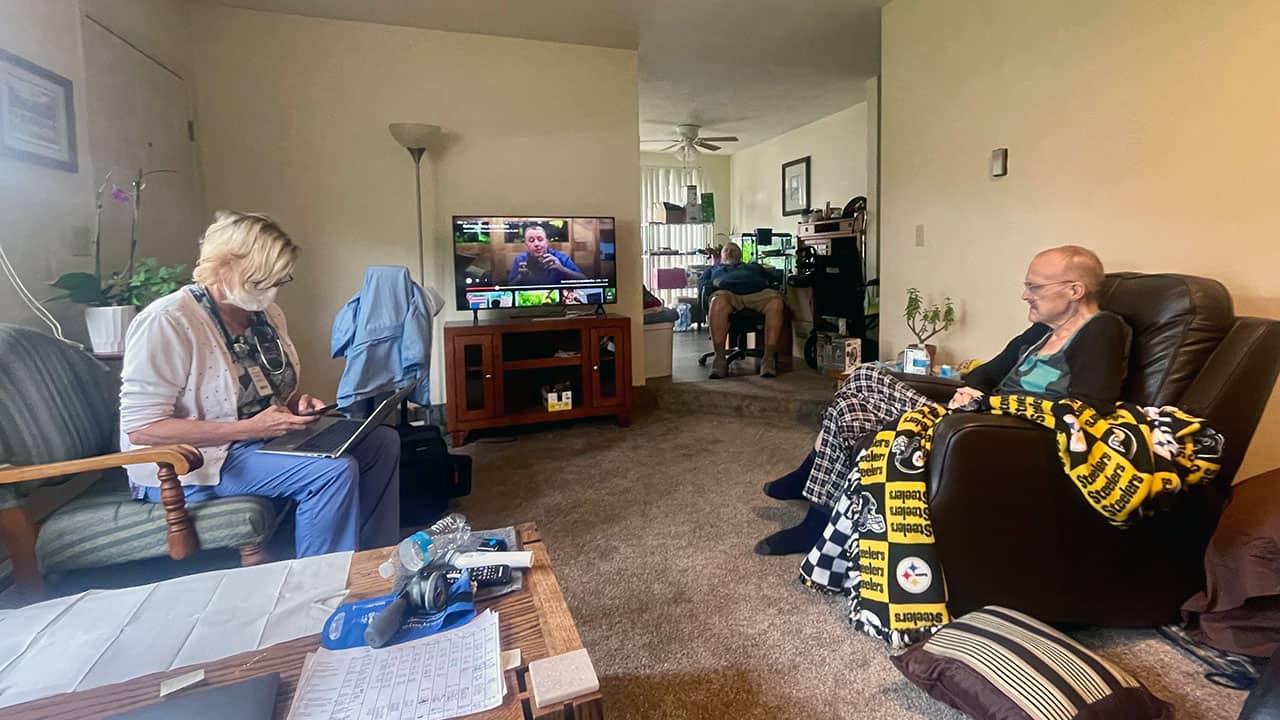
This enthusiasm is short lived. You lapse into delirium. You are frustrated and angry. You sleep most of the time. Bob and I wheel you from room to room at your request, but you have no energy to do anything. You eat little. Lucid conversation becomes rare.
At one point, you and I attempt to watch As Good As It Gets. It’s been your favorite movie for decades. You think Jack Nicholson is hilarious in the film and you frequently quote Melvin Udall’s lines, such as:
Where did they teach you to talk like this? In some Panama City “sailor wanna hump-hump” bar? Or is it getaway day and your last shot at his whiskey? Sell crazy someplace else. We’re all stocked up here.
But you don’t have the energy and attention to watch the movie. You fall asleep after twenty minutes. When you wake an hour later, you’re confused. “What are we watching?” you ask. I don’t try to explain.
It’s 18 April 2022. You have returned from a weekend in “respite care”. You volunteered to stay in a hospice facility for a few nights so that Bob could celebrate Easter with his family and so that I could celebrate my ten-year anniversary with Kim.
Now, though, you are completely disoriented. You don’t know where you are. You don’t know why you’re medicated. You don’t know why you’re confined to bed. You repeatedly try to climb down, but you lack the strength to do so. You are agitated and hostile, accusing me and Bob of playing a joke on you.
It’s 19 April 2022. You remain agitated. You curse us. You demand that we get you out of bed. You demand that we take you to the kitchen, then to the living room, then outside to look at your flowers, then inside because it’s too cold, then outside again because you’ve forgotten we were outside just five minutes ago.
Bob attempts to get some work done, but it’s impossible. For ten hours, you are agitated and irritable. You are delirious. You try to bite Bob. You throw feeble punches at me. You are clearly frustrated, like a caged animal who does not understand its plight.
You have a few brief moments of lucidity throughout the day. In these, you tell us that you love us and appreciate us.
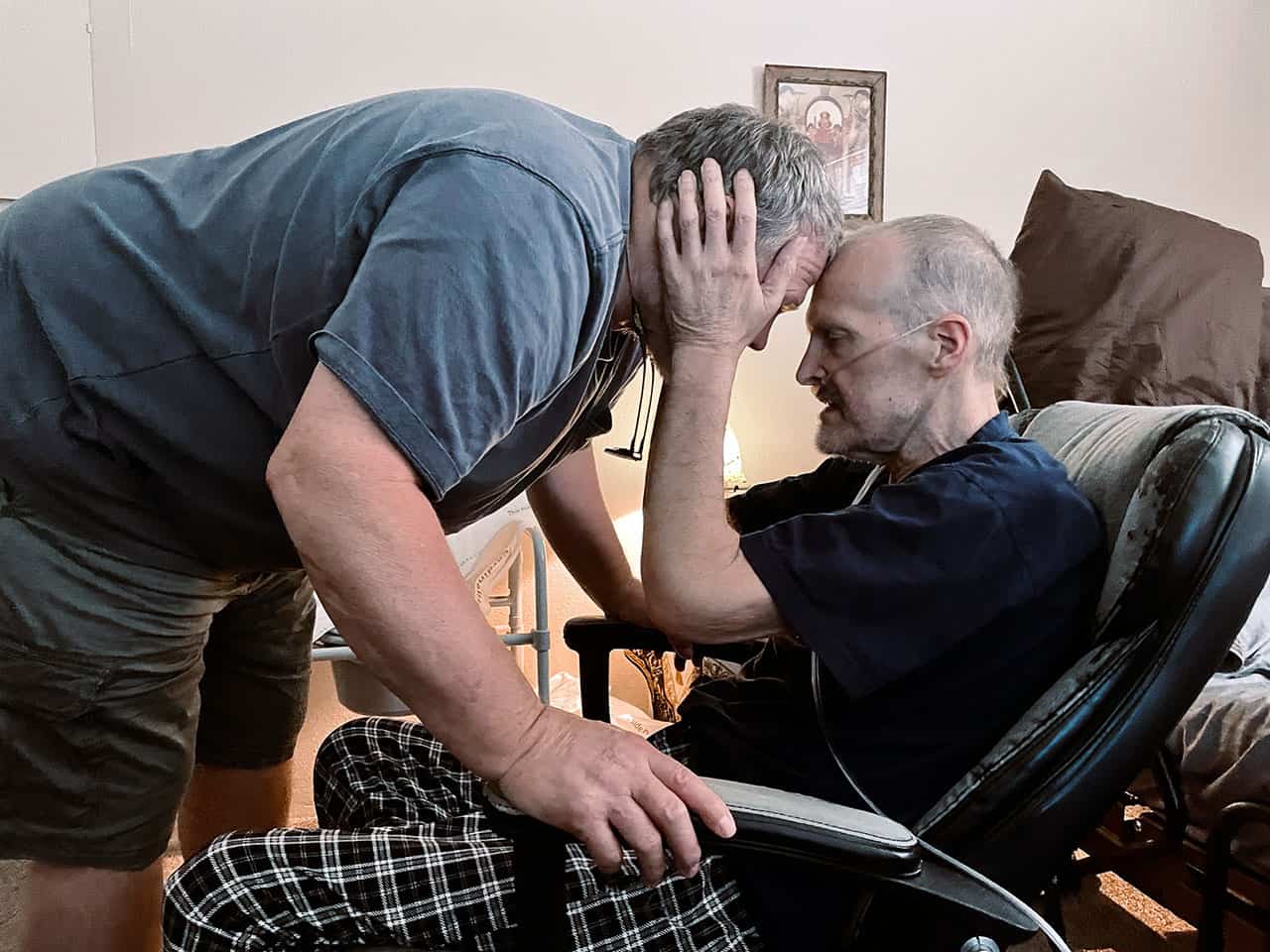
Mostly, though, you are lost. “What happened?” you ask. “You have cancer,” we say. “I do?” you say. “Will I live?” you ask. Bob and I shake our heads.
Your agitation grows throughout the day. Again you accuse us of playing a cruel joke on you. You call Hector and berate him for pranking you. You call Kathy and do the same. Bob and I are at our wits’ end. We call hospice and they send out Nurse Margaret.
Nurse Margaret gets permission for us to administer phenobarbital, which we do at six in the evening. Within fifteen minutes, you have calmed. Soon you grow groggy. You fall asleep.
It’s 20 April 2022. You wake grumpy. Bob and I are reluctant to administer the phenobarbital because it knocks you out. But when we don’t administer it, you are agitated. He and I discuss things with the hospice nurse and decide that we have to use the phenobarbital. Before we give you the next dose, however, we ask if you want anything to eat. “Eyes uh,” you say.
You want ice cream. I bring you a bowl of chocolate gelato. Bob feeds you three bites before you fall asleep. This is the last thing you will ever eat.
Hector comes to visit. So do your nieces and nephews. Despite the voices and laughter throughout the apartment, you do not stir.
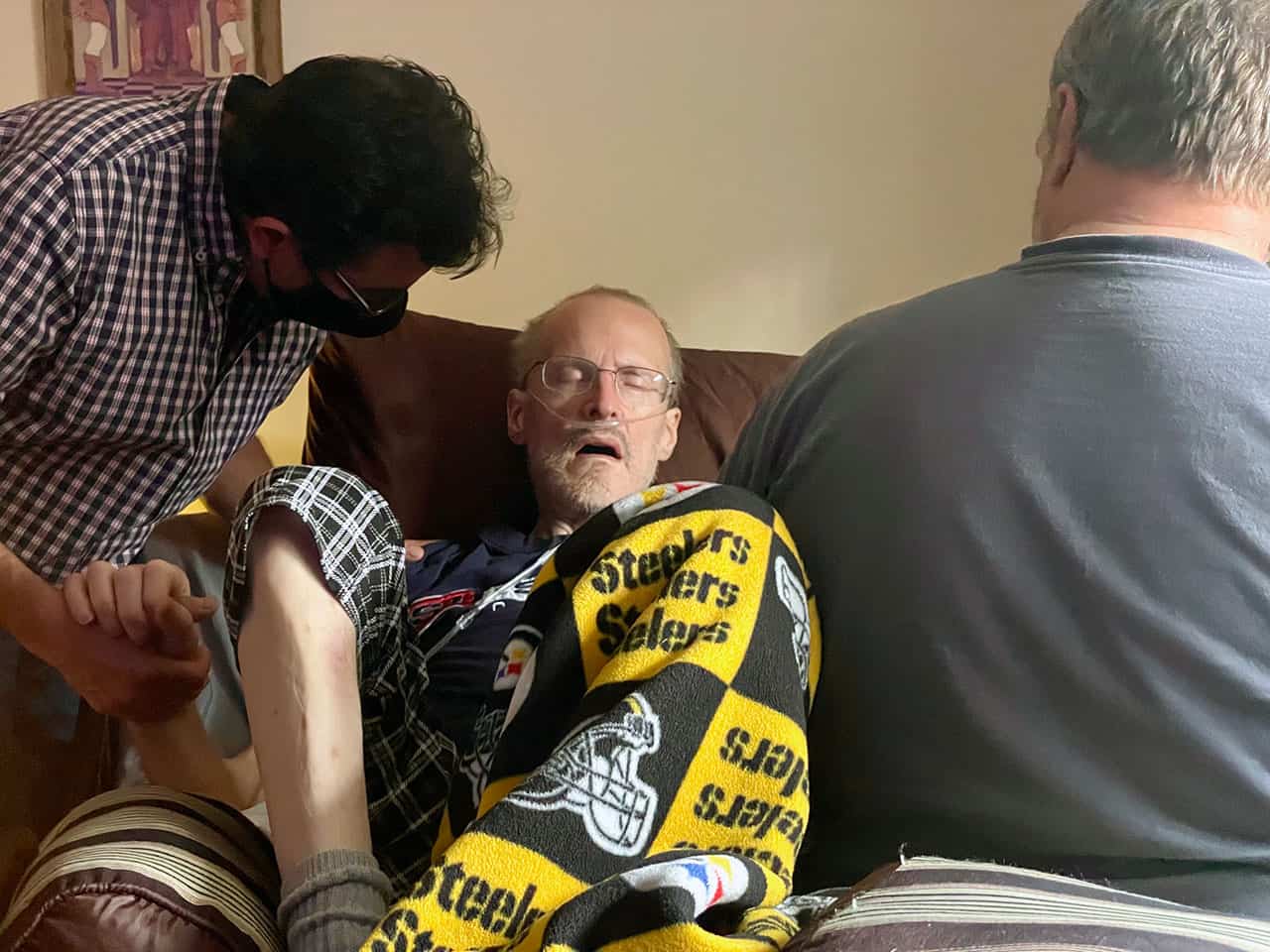
In the late afternoon, you wake for a few moments. There’s a crowd around your bedside. You look from face to face. It’s not clear that you recognize us. “Nick, how are you doing?” Hector asks. “It’s me, Hector.”
Hector points to your niece. “Do you know who that is?” he asks.
“Janissa,” you whisper.
Hector points to me. “Do you know who that is?” he asks.
“J.D.,” you whisper.
You make a move as if to hold Janissa’s hand, but when she reaches out you flip your middle finger and grin.
These are the last words you ever say. This is your last conscious action. You fall back asleep. You will never wake again.
For the next several days, Bob and I sit by your bedside. We share childhood memories. He talks to me about his faith. I talk to him about my lack of faith. Bob plays hymns for you on YouTube. I play Taylor Swift. We watch the cichlids in your aquarium. Bob and I administer your care to the best of our abilities. We don’t really know what we’re doing but we love you and we do what we can. The hospice nurses praise us but we’re not sure we deserve their kind words.
Hector drives down to see you nearly every day. He spends hours at your bedside. He cleans and grooms you. He adjusts your position to make you more comfortable. He chatters at you. When Hector is there, Bob and I run errands. We shower. We eat. Other friends and family come to see you and to sit by your side.
When we’re bored, Bob and I begin doing the things we know will need to be done. We begin packing your stuff. We begin gathering account information and passwords. We begin cleaning the house. These actions no longer seem like a betrayal. They seem like acceptance.
I will come into your bedroom to find Bob asleep at your side, his hand in yours. Bob will come into your bedroom to find me asleep at your side, my hand in yours.
I sleep in a recliner next to your bed. Each morning, my back is sore but I don’t care. I want to be close enough to hear changes in your breathing. Some nights, Bob sleeps in an office chair next to your bed.
We await the inevitable.
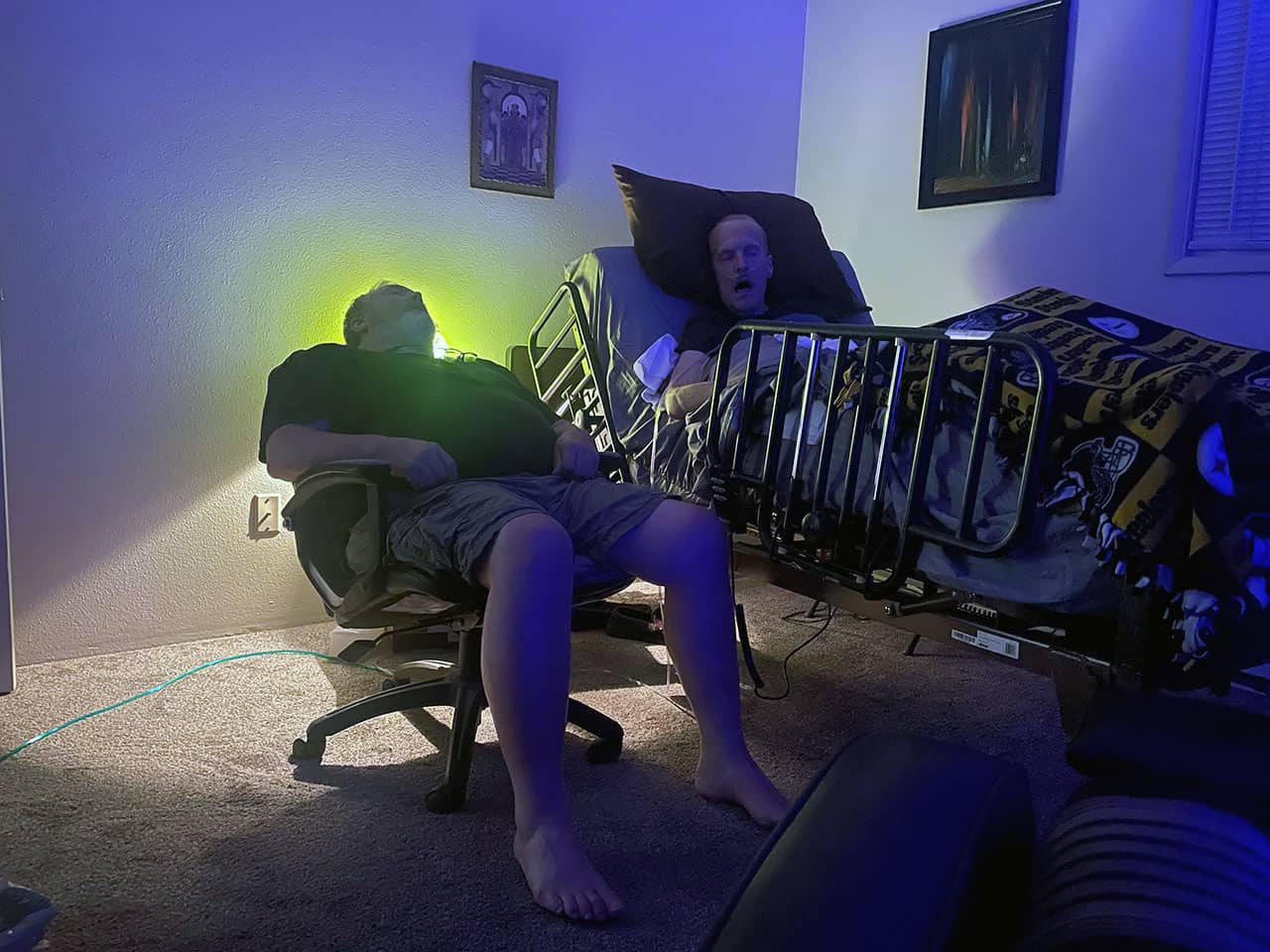
It’s 25 April 2022. Bob wakes me at five minutes before seven: “I think he’s going.”
Your vitals are weak and erratic. I wake your nieces and nephews, who have stayed the night with us. I administer your meds, which are due at seven anyhow. Your vitals stabilize. We breathe a sigh of relief.
The family spends the morning sitting around your bedside chatting, much as we have all week.
Nurse Mary comes at ten for your daily visit. The kids leave the room while she and Bob and I talk about your condition. We adjust your bed. We re-arrange the cushions. We take your vitals. Taylor Swift’s “Red” is playing in the background.
Mary removes your oxygen mask in order to clean your mouth. She and Bob lean in close. I am standing at the foot of your bed. Your oxygen saturation drops from 67 to 37 but your pulse stays steady at 105. The three of us focus on your mouth as Mary explains what she’s doing with the cotton swabs. She wipes with one swab. She wipes with a second. I glance down at the pulse oximeter. There are no numbers there. The pulse line is flat. I look at your chest. You are no longer breathing.
“He has no vitals,” I say.
Bob and Mary step back from your bed. “He’s gone,” says the nurse. And you are. You are gone. It is 10:15 on a Monday morning, and — just like that — you have left this world.
You were my cousin. You were five years older than me. You and I shared similar temperaments, similar interests, similar philosophies. We read similar books. We played the same games. We confided our deepest secrets with each other. We encouraged each other. We called each other out on our bullshit. You taught me much about life. I did my best to teach you. You were my cousin. You were my friend. Get Rich Slowly would not exist without you.

